Marine Insurance Law
VerifiedAdded on 2022/10/14
|19
|5795
|224
AI Summary
This essay discusses the obligations and rights of the insurer under the contract of insurance signed with Bora, within the purview of English law. It also covers the legal clauses and legislations that govern marine insurance in particular.
Contribute Materials
Your contribution can guide someone’s learning journey. Share your
documents today.
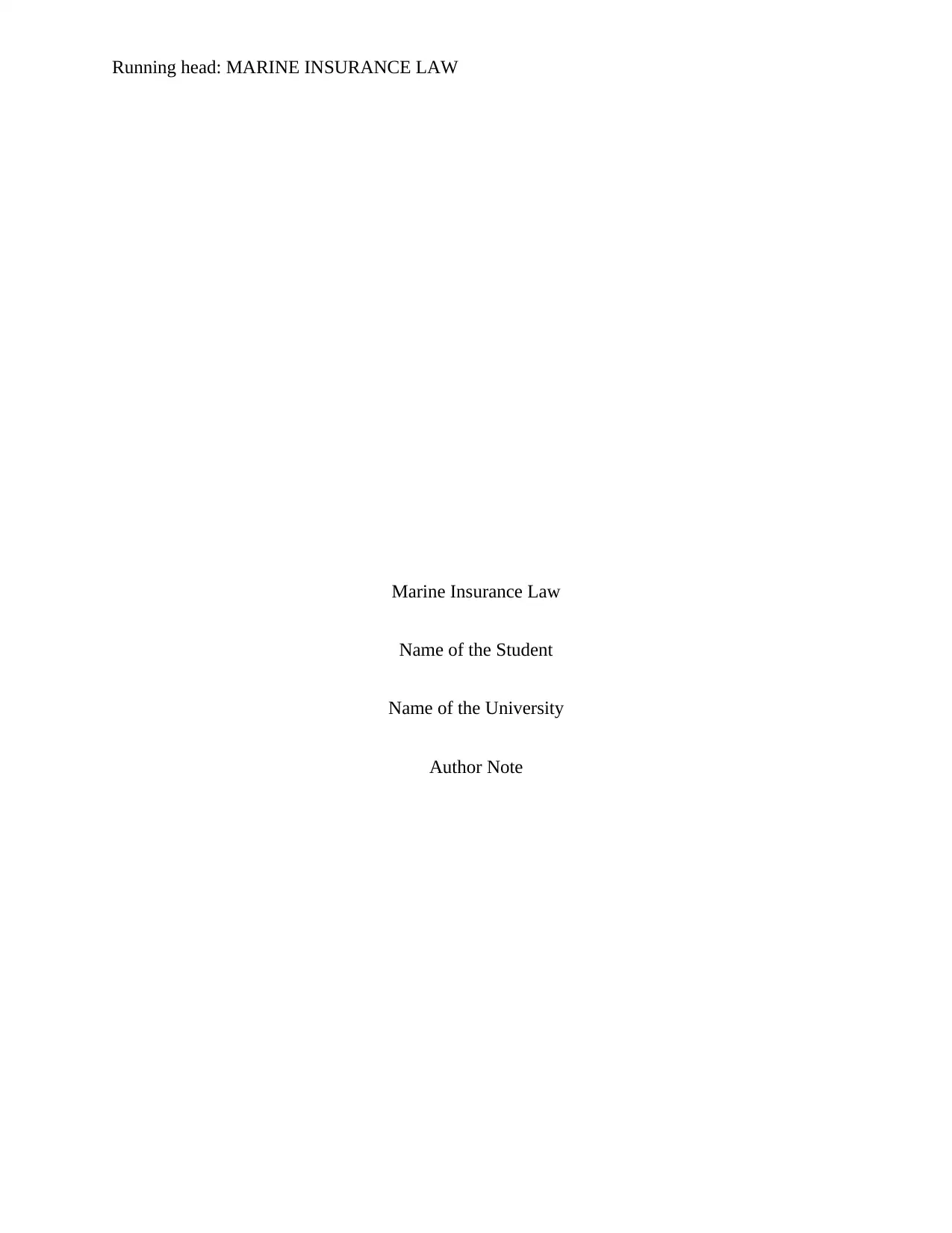
Running head: MARINE INSURANCE LAW
Marine Insurance Law
Name of the Student
Name of the University
Author Note
Marine Insurance Law
Name of the Student
Name of the University
Author Note
Secure Best Marks with AI Grader
Need help grading? Try our AI Grader for instant feedback on your assignments.
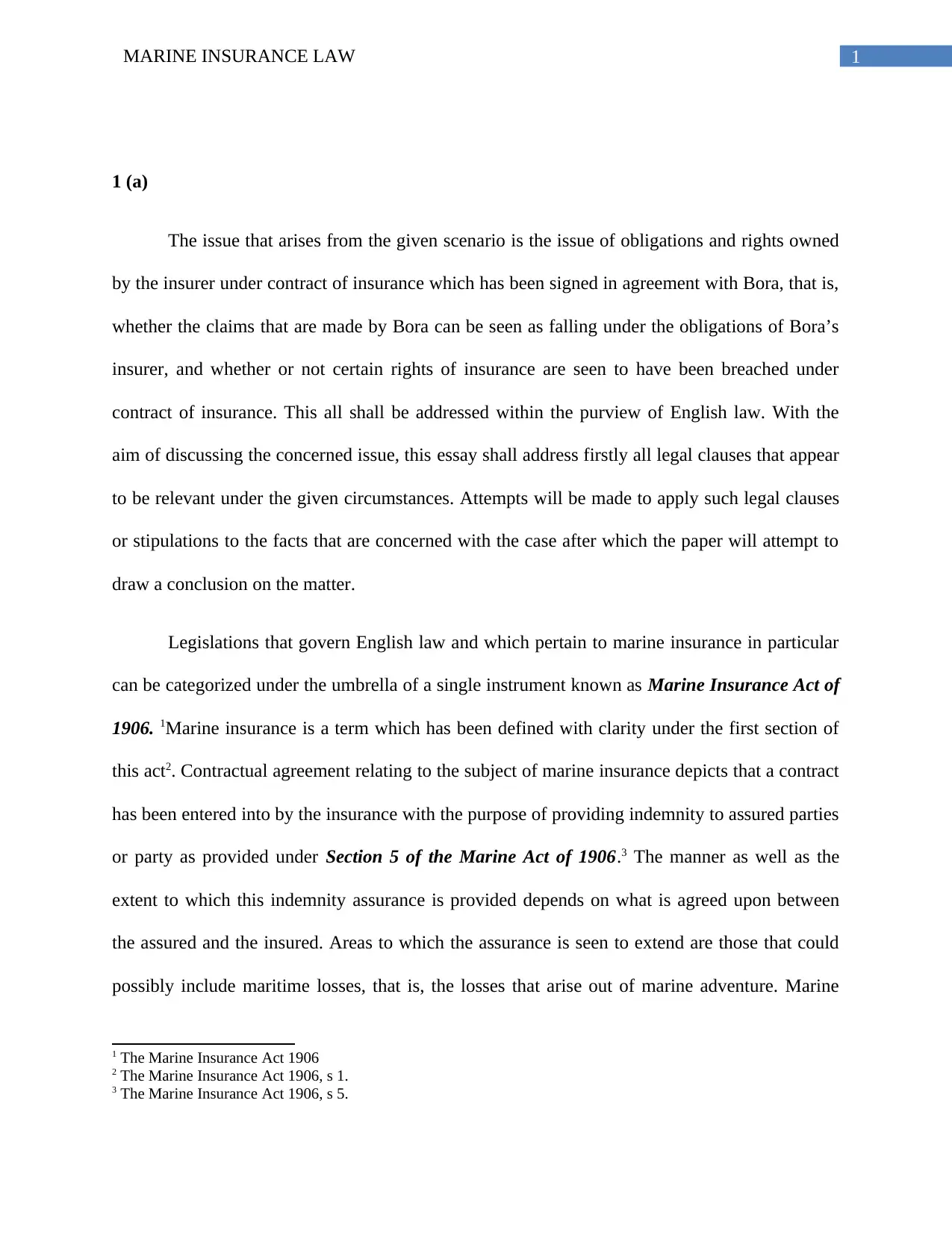
1MARINE INSURANCE LAW
1 (a)
The issue that arises from the given scenario is the issue of obligations and rights owned
by the insurer under contract of insurance which has been signed in agreement with Bora, that is,
whether the claims that are made by Bora can be seen as falling under the obligations of Bora’s
insurer, and whether or not certain rights of insurance are seen to have been breached under
contract of insurance. This all shall be addressed within the purview of English law. With the
aim of discussing the concerned issue, this essay shall address firstly all legal clauses that appear
to be relevant under the given circumstances. Attempts will be made to apply such legal clauses
or stipulations to the facts that are concerned with the case after which the paper will attempt to
draw a conclusion on the matter.
Legislations that govern English law and which pertain to marine insurance in particular
can be categorized under the umbrella of a single instrument known as Marine Insurance Act of
1906. 1Marine insurance is a term which has been defined with clarity under the first section of
this act2. Contractual agreement relating to the subject of marine insurance depicts that a contract
has been entered into by the insurance with the purpose of providing indemnity to assured parties
or party as provided under Section 5 of the Marine Act of 1906.3 The manner as well as the
extent to which this indemnity assurance is provided depends on what is agreed upon between
the assured and the insured. Areas to which the assurance is seen to extend are those that could
possibly include maritime losses, that is, the losses that arise out of marine adventure. Marine
1 The Marine Insurance Act 1906
2 The Marine Insurance Act 1906, s 1.
3 The Marine Insurance Act 1906, s 5.
1 (a)
The issue that arises from the given scenario is the issue of obligations and rights owned
by the insurer under contract of insurance which has been signed in agreement with Bora, that is,
whether the claims that are made by Bora can be seen as falling under the obligations of Bora’s
insurer, and whether or not certain rights of insurance are seen to have been breached under
contract of insurance. This all shall be addressed within the purview of English law. With the
aim of discussing the concerned issue, this essay shall address firstly all legal clauses that appear
to be relevant under the given circumstances. Attempts will be made to apply such legal clauses
or stipulations to the facts that are concerned with the case after which the paper will attempt to
draw a conclusion on the matter.
Legislations that govern English law and which pertain to marine insurance in particular
can be categorized under the umbrella of a single instrument known as Marine Insurance Act of
1906. 1Marine insurance is a term which has been defined with clarity under the first section of
this act2. Contractual agreement relating to the subject of marine insurance depicts that a contract
has been entered into by the insurance with the purpose of providing indemnity to assured parties
or party as provided under Section 5 of the Marine Act of 1906.3 The manner as well as the
extent to which this indemnity assurance is provided depends on what is agreed upon between
the assured and the insured. Areas to which the assurance is seen to extend are those that could
possibly include maritime losses, that is, the losses that arise out of marine adventure. Marine
1 The Marine Insurance Act 1906
2 The Marine Insurance Act 1906, s 1.
3 The Marine Insurance Act 1906, s 5.
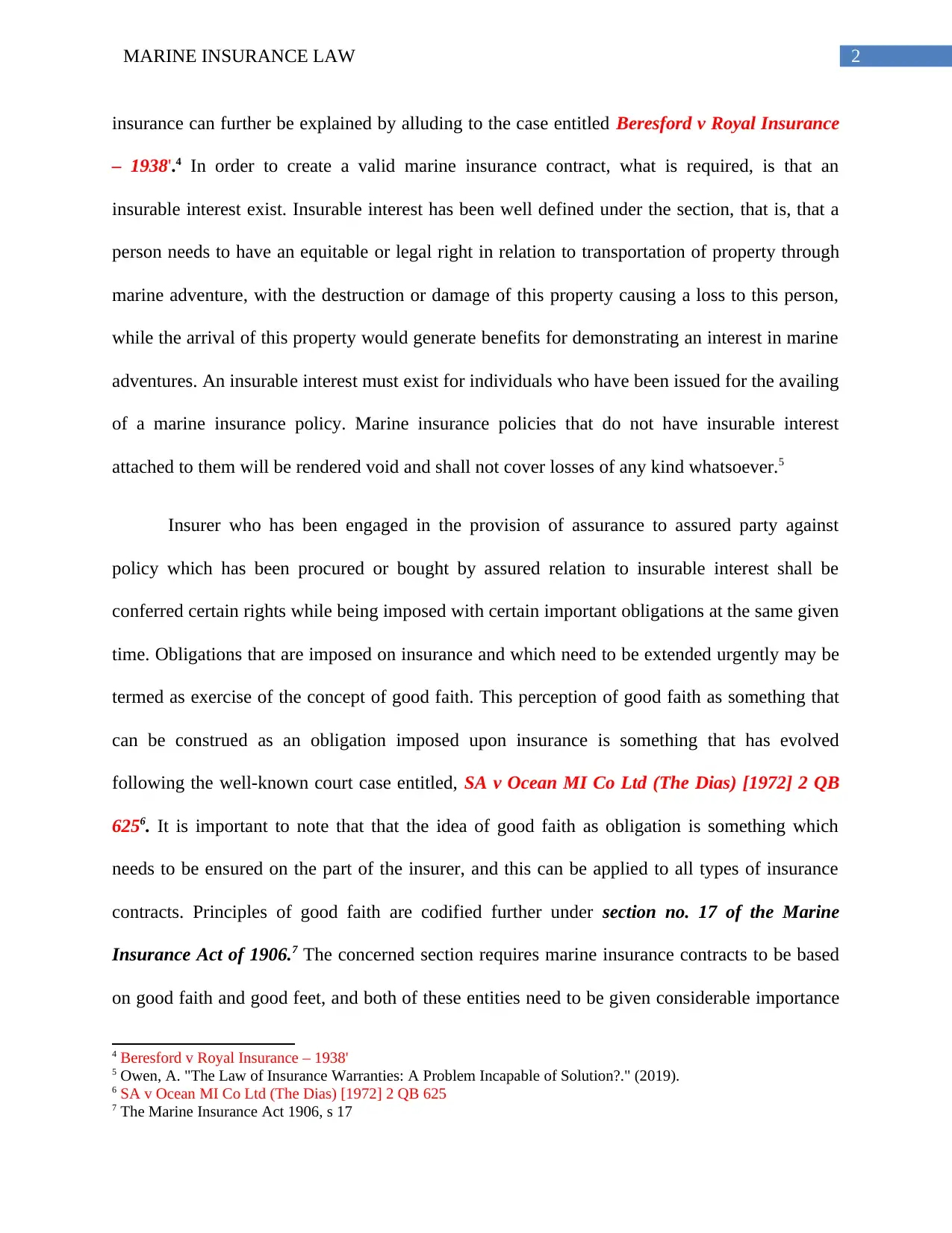
2MARINE INSURANCE LAW
insurance can further be explained by alluding to the case entitled Beresford v Royal Insurance
– 1938'.4 In order to create a valid marine insurance contract, what is required, is that an
insurable interest exist. Insurable interest has been well defined under the section, that is, that a
person needs to have an equitable or legal right in relation to transportation of property through
marine adventure, with the destruction or damage of this property causing a loss to this person,
while the arrival of this property would generate benefits for demonstrating an interest in marine
adventures. An insurable interest must exist for individuals who have been issued for the availing
of a marine insurance policy. Marine insurance policies that do not have insurable interest
attached to them will be rendered void and shall not cover losses of any kind whatsoever.5
Insurer who has been engaged in the provision of assurance to assured party against
policy which has been procured or bought by assured relation to insurable interest shall be
conferred certain rights while being imposed with certain important obligations at the same given
time. Obligations that are imposed on insurance and which need to be extended urgently may be
termed as exercise of the concept of good faith. This perception of good faith as something that
can be construed as an obligation imposed upon insurance is something that has evolved
following the well-known court case entitled, SA v Ocean MI Co Ltd (The Dias) [1972] 2 QB
6256. It is important to note that that the idea of good faith as obligation is something which
needs to be ensured on the part of the insurer, and this can be applied to all types of insurance
contracts. Principles of good faith are codified further under section no. 17 of the Marine
Insurance Act of 1906.7 The concerned section requires marine insurance contracts to be based
on good faith and good feet, and both of these entities need to be given considerable importance
4 Beresford v Royal Insurance – 1938'
5 Owen, A. "The Law of Insurance Warranties: A Problem Incapable of Solution?." (2019).
6 SA v Ocean MI Co Ltd (The Dias) [1972] 2 QB 625
7 The Marine Insurance Act 1906, s 17
insurance can further be explained by alluding to the case entitled Beresford v Royal Insurance
– 1938'.4 In order to create a valid marine insurance contract, what is required, is that an
insurable interest exist. Insurable interest has been well defined under the section, that is, that a
person needs to have an equitable or legal right in relation to transportation of property through
marine adventure, with the destruction or damage of this property causing a loss to this person,
while the arrival of this property would generate benefits for demonstrating an interest in marine
adventures. An insurable interest must exist for individuals who have been issued for the availing
of a marine insurance policy. Marine insurance policies that do not have insurable interest
attached to them will be rendered void and shall not cover losses of any kind whatsoever.5
Insurer who has been engaged in the provision of assurance to assured party against
policy which has been procured or bought by assured relation to insurable interest shall be
conferred certain rights while being imposed with certain important obligations at the same given
time. Obligations that are imposed on insurance and which need to be extended urgently may be
termed as exercise of the concept of good faith. This perception of good faith as something that
can be construed as an obligation imposed upon insurance is something that has evolved
following the well-known court case entitled, SA v Ocean MI Co Ltd (The Dias) [1972] 2 QB
6256. It is important to note that that the idea of good faith as obligation is something which
needs to be ensured on the part of the insurer, and this can be applied to all types of insurance
contracts. Principles of good faith are codified further under section no. 17 of the Marine
Insurance Act of 1906.7 The concerned section requires marine insurance contracts to be based
on good faith and good feet, and both of these entities need to be given considerable importance
4 Beresford v Royal Insurance – 1938'
5 Owen, A. "The Law of Insurance Warranties: A Problem Incapable of Solution?." (2019).
6 SA v Ocean MI Co Ltd (The Dias) [1972] 2 QB 625
7 The Marine Insurance Act 1906, s 17
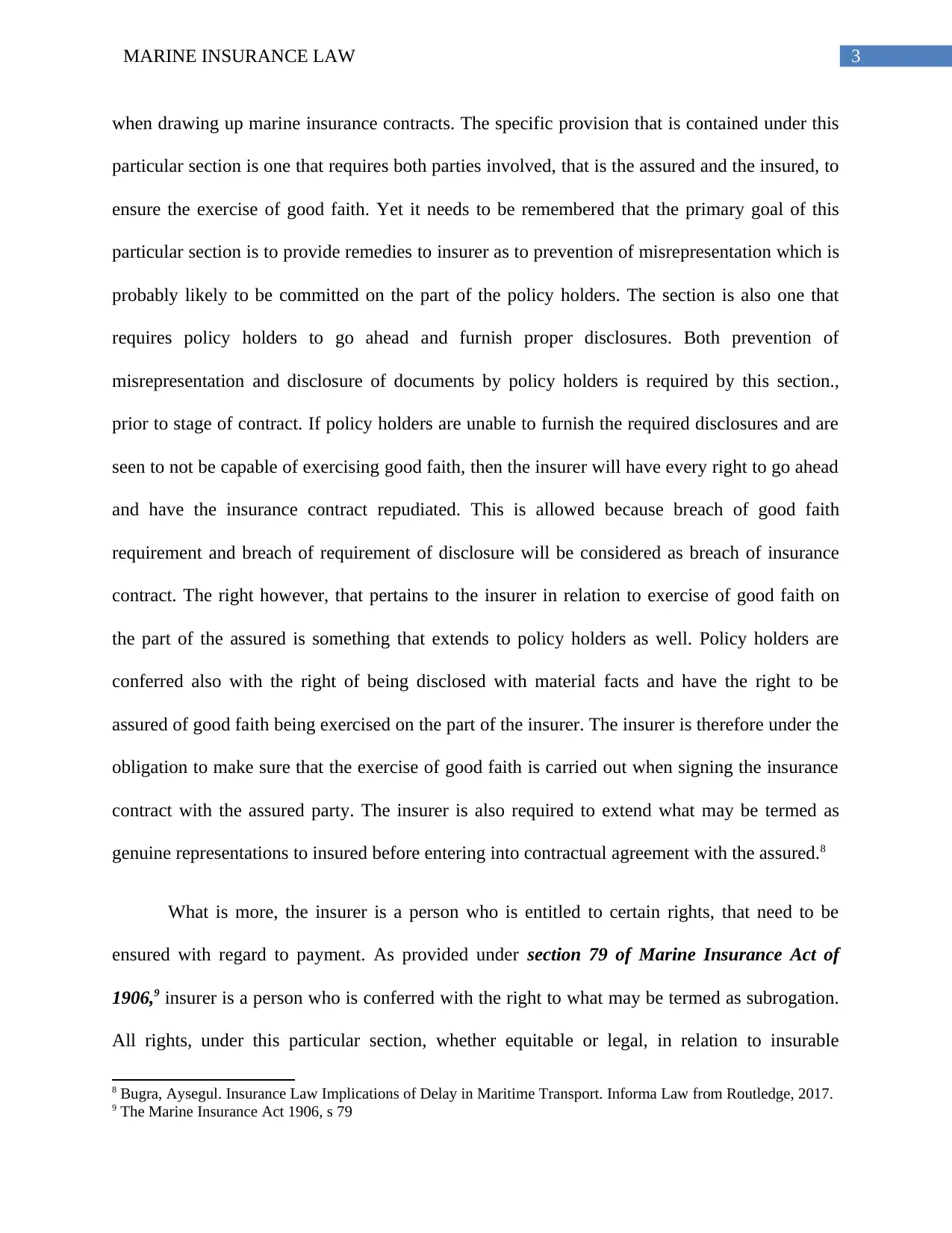
3MARINE INSURANCE LAW
when drawing up marine insurance contracts. The specific provision that is contained under this
particular section is one that requires both parties involved, that is the assured and the insured, to
ensure the exercise of good faith. Yet it needs to be remembered that the primary goal of this
particular section is to provide remedies to insurer as to prevention of misrepresentation which is
probably likely to be committed on the part of the policy holders. The section is also one that
requires policy holders to go ahead and furnish proper disclosures. Both prevention of
misrepresentation and disclosure of documents by policy holders is required by this section.,
prior to stage of contract. If policy holders are unable to furnish the required disclosures and are
seen to not be capable of exercising good faith, then the insurer will have every right to go ahead
and have the insurance contract repudiated. This is allowed because breach of good faith
requirement and breach of requirement of disclosure will be considered as breach of insurance
contract. The right however, that pertains to the insurer in relation to exercise of good faith on
the part of the assured is something that extends to policy holders as well. Policy holders are
conferred also with the right of being disclosed with material facts and have the right to be
assured of good faith being exercised on the part of the insurer. The insurer is therefore under the
obligation to make sure that the exercise of good faith is carried out when signing the insurance
contract with the assured party. The insurer is also required to extend what may be termed as
genuine representations to insured before entering into contractual agreement with the assured.8
What is more, the insurer is a person who is entitled to certain rights, that need to be
ensured with regard to payment. As provided under section 79 of Marine Insurance Act of
1906,9 insurer is a person who is conferred with the right to what may be termed as subrogation.
All rights, under this particular section, whether equitable or legal, in relation to insurable
8 Bugra, Aysegul. Insurance Law Implications of Delay in Maritime Transport. Informa Law from Routledge, 2017.
9 The Marine Insurance Act 1906, s 79
when drawing up marine insurance contracts. The specific provision that is contained under this
particular section is one that requires both parties involved, that is the assured and the insured, to
ensure the exercise of good faith. Yet it needs to be remembered that the primary goal of this
particular section is to provide remedies to insurer as to prevention of misrepresentation which is
probably likely to be committed on the part of the policy holders. The section is also one that
requires policy holders to go ahead and furnish proper disclosures. Both prevention of
misrepresentation and disclosure of documents by policy holders is required by this section.,
prior to stage of contract. If policy holders are unable to furnish the required disclosures and are
seen to not be capable of exercising good faith, then the insurer will have every right to go ahead
and have the insurance contract repudiated. This is allowed because breach of good faith
requirement and breach of requirement of disclosure will be considered as breach of insurance
contract. The right however, that pertains to the insurer in relation to exercise of good faith on
the part of the assured is something that extends to policy holders as well. Policy holders are
conferred also with the right of being disclosed with material facts and have the right to be
assured of good faith being exercised on the part of the insurer. The insurer is therefore under the
obligation to make sure that the exercise of good faith is carried out when signing the insurance
contract with the assured party. The insurer is also required to extend what may be termed as
genuine representations to insured before entering into contractual agreement with the assured.8
What is more, the insurer is a person who is entitled to certain rights, that need to be
ensured with regard to payment. As provided under section 79 of Marine Insurance Act of
1906,9 insurer is a person who is conferred with the right to what may be termed as subrogation.
All rights, under this particular section, whether equitable or legal, in relation to insurable
8 Bugra, Aysegul. Insurance Law Implications of Delay in Maritime Transport. Informa Law from Routledge, 2017.
9 The Marine Insurance Act 1906, s 79
Secure Best Marks with AI Grader
Need help grading? Try our AI Grader for instant feedback on your assignments.
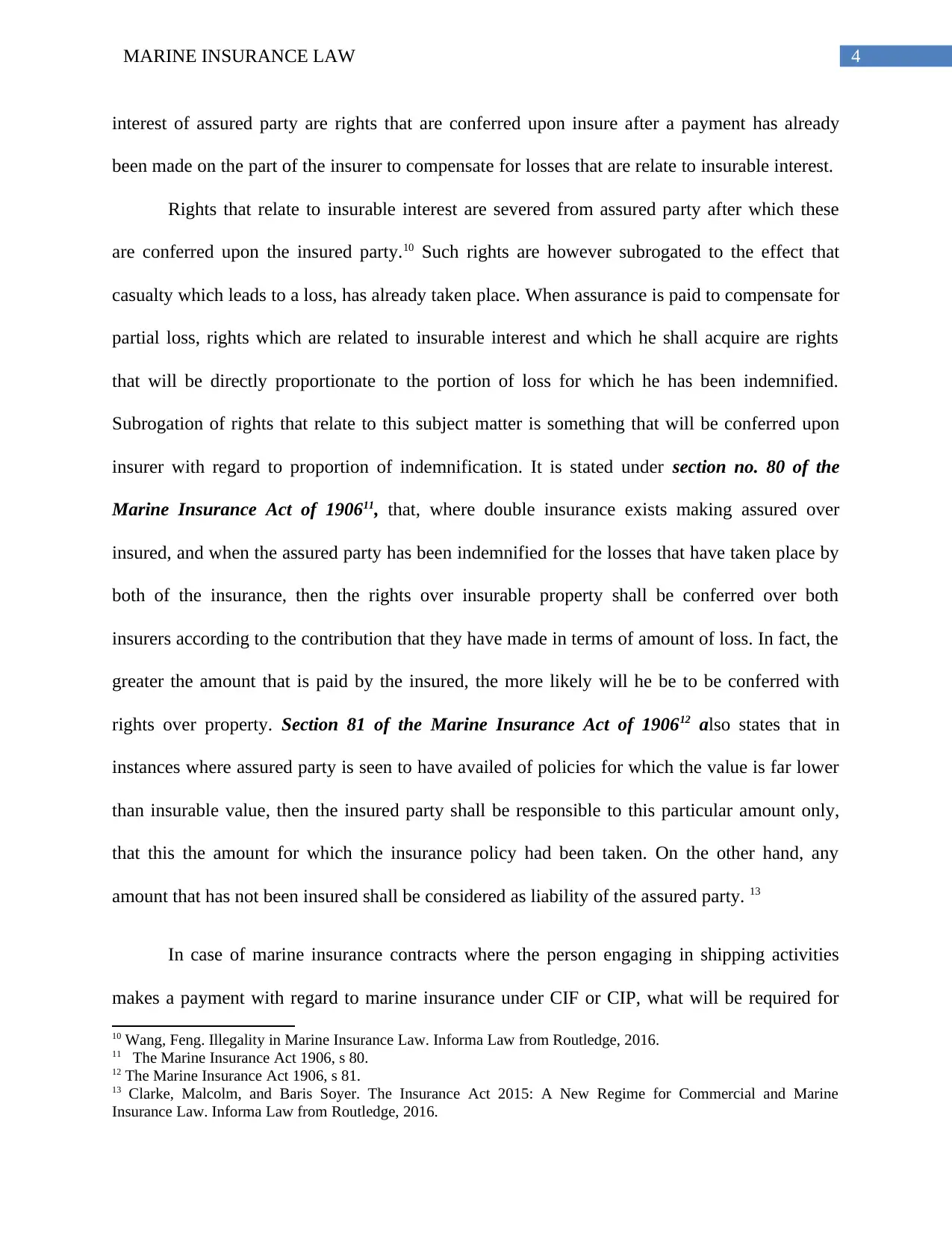
4MARINE INSURANCE LAW
interest of assured party are rights that are conferred upon insure after a payment has already
been made on the part of the insurer to compensate for losses that are relate to insurable interest.
Rights that relate to insurable interest are severed from assured party after which these
are conferred upon the insured party.10 Such rights are however subrogated to the effect that
casualty which leads to a loss, has already taken place. When assurance is paid to compensate for
partial loss, rights which are related to insurable interest and which he shall acquire are rights
that will be directly proportionate to the portion of loss for which he has been indemnified.
Subrogation of rights that relate to this subject matter is something that will be conferred upon
insurer with regard to proportion of indemnification. It is stated under section no. 80 of the
Marine Insurance Act of 190611, that, where double insurance exists making assured over
insured, and when the assured party has been indemnified for the losses that have taken place by
both of the insurance, then the rights over insurable property shall be conferred over both
insurers according to the contribution that they have made in terms of amount of loss. In fact, the
greater the amount that is paid by the insured, the more likely will he be to be conferred with
rights over property. Section 81 of the Marine Insurance Act of 190612 also states that in
instances where assured party is seen to have availed of policies for which the value is far lower
than insurable value, then the insured party shall be responsible to this particular amount only,
that this the amount for which the insurance policy had been taken. On the other hand, any
amount that has not been insured shall be considered as liability of the assured party. 13
In case of marine insurance contracts where the person engaging in shipping activities
makes a payment with regard to marine insurance under CIF or CIP, what will be required for
10 Wang, Feng. Illegality in Marine Insurance Law. Informa Law from Routledge, 2016.
11 The Marine Insurance Act 1906, s 80.
12 The Marine Insurance Act 1906, s 81.
13 Clarke, Malcolm, and Baris Soyer. The Insurance Act 2015: A New Regime for Commercial and Marine
Insurance Law. Informa Law from Routledge, 2016.
interest of assured party are rights that are conferred upon insure after a payment has already
been made on the part of the insurer to compensate for losses that are relate to insurable interest.
Rights that relate to insurable interest are severed from assured party after which these
are conferred upon the insured party.10 Such rights are however subrogated to the effect that
casualty which leads to a loss, has already taken place. When assurance is paid to compensate for
partial loss, rights which are related to insurable interest and which he shall acquire are rights
that will be directly proportionate to the portion of loss for which he has been indemnified.
Subrogation of rights that relate to this subject matter is something that will be conferred upon
insurer with regard to proportion of indemnification. It is stated under section no. 80 of the
Marine Insurance Act of 190611, that, where double insurance exists making assured over
insured, and when the assured party has been indemnified for the losses that have taken place by
both of the insurance, then the rights over insurable property shall be conferred over both
insurers according to the contribution that they have made in terms of amount of loss. In fact, the
greater the amount that is paid by the insured, the more likely will he be to be conferred with
rights over property. Section 81 of the Marine Insurance Act of 190612 also states that in
instances where assured party is seen to have availed of policies for which the value is far lower
than insurable value, then the insured party shall be responsible to this particular amount only,
that this the amount for which the insurance policy had been taken. On the other hand, any
amount that has not been insured shall be considered as liability of the assured party. 13
In case of marine insurance contracts where the person engaging in shipping activities
makes a payment with regard to marine insurance under CIF or CIP, what will be required for
10 Wang, Feng. Illegality in Marine Insurance Law. Informa Law from Routledge, 2016.
11 The Marine Insurance Act 1906, s 80.
12 The Marine Insurance Act 1906, s 81.
13 Clarke, Malcolm, and Baris Soyer. The Insurance Act 2015: A New Regime for Commercial and Marine
Insurance Law. Informa Law from Routledge, 2016.
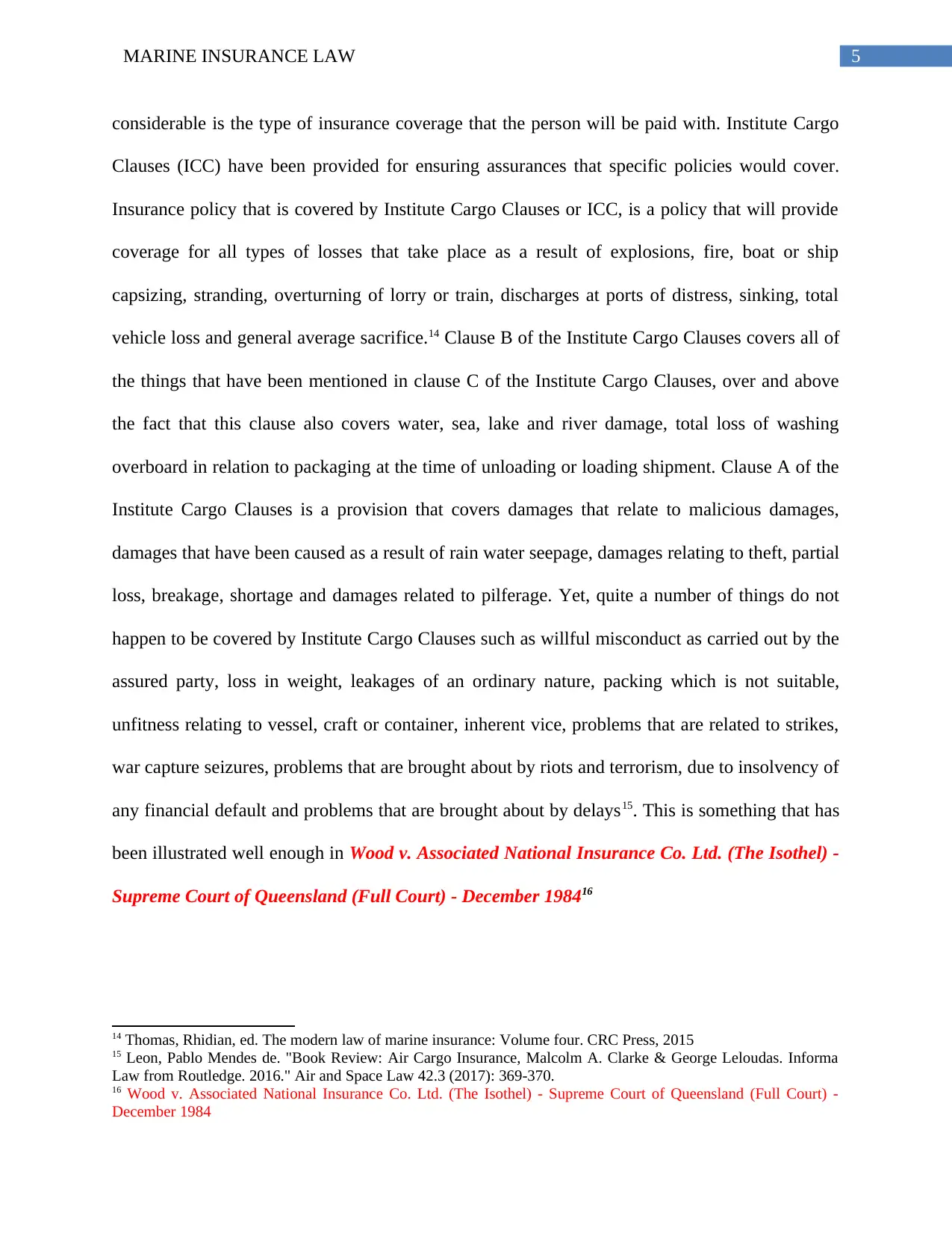
5MARINE INSURANCE LAW
considerable is the type of insurance coverage that the person will be paid with. Institute Cargo
Clauses (ICC) have been provided for ensuring assurances that specific policies would cover.
Insurance policy that is covered by Institute Cargo Clauses or ICC, is a policy that will provide
coverage for all types of losses that take place as a result of explosions, fire, boat or ship
capsizing, stranding, overturning of lorry or train, discharges at ports of distress, sinking, total
vehicle loss and general average sacrifice.14 Clause B of the Institute Cargo Clauses covers all of
the things that have been mentioned in clause C of the Institute Cargo Clauses, over and above
the fact that this clause also covers water, sea, lake and river damage, total loss of washing
overboard in relation to packaging at the time of unloading or loading shipment. Clause A of the
Institute Cargo Clauses is a provision that covers damages that relate to malicious damages,
damages that have been caused as a result of rain water seepage, damages relating to theft, partial
loss, breakage, shortage and damages related to pilferage. Yet, quite a number of things do not
happen to be covered by Institute Cargo Clauses such as willful misconduct as carried out by the
assured party, loss in weight, leakages of an ordinary nature, packing which is not suitable,
unfitness relating to vessel, craft or container, inherent vice, problems that are related to strikes,
war capture seizures, problems that are brought about by riots and terrorism, due to insolvency of
any financial default and problems that are brought about by delays15. This is something that has
been illustrated well enough in Wood v. Associated National Insurance Co. Ltd. (The Isothel) -
Supreme Court of Queensland (Full Court) - December 198416
14 Thomas, Rhidian, ed. The modern law of marine insurance: Volume four. CRC Press, 2015
15 Leon, Pablo Mendes de. "Book Review: Air Cargo Insurance, Malcolm A. Clarke & George Leloudas. Informa
Law from Routledge. 2016." Air and Space Law 42.3 (2017): 369-370.
16 Wood v. Associated National Insurance Co. Ltd. (The Isothel) - Supreme Court of Queensland (Full Court) -
December 1984
considerable is the type of insurance coverage that the person will be paid with. Institute Cargo
Clauses (ICC) have been provided for ensuring assurances that specific policies would cover.
Insurance policy that is covered by Institute Cargo Clauses or ICC, is a policy that will provide
coverage for all types of losses that take place as a result of explosions, fire, boat or ship
capsizing, stranding, overturning of lorry or train, discharges at ports of distress, sinking, total
vehicle loss and general average sacrifice.14 Clause B of the Institute Cargo Clauses covers all of
the things that have been mentioned in clause C of the Institute Cargo Clauses, over and above
the fact that this clause also covers water, sea, lake and river damage, total loss of washing
overboard in relation to packaging at the time of unloading or loading shipment. Clause A of the
Institute Cargo Clauses is a provision that covers damages that relate to malicious damages,
damages that have been caused as a result of rain water seepage, damages relating to theft, partial
loss, breakage, shortage and damages related to pilferage. Yet, quite a number of things do not
happen to be covered by Institute Cargo Clauses such as willful misconduct as carried out by the
assured party, loss in weight, leakages of an ordinary nature, packing which is not suitable,
unfitness relating to vessel, craft or container, inherent vice, problems that are related to strikes,
war capture seizures, problems that are brought about by riots and terrorism, due to insolvency of
any financial default and problems that are brought about by delays15. This is something that has
been illustrated well enough in Wood v. Associated National Insurance Co. Ltd. (The Isothel) -
Supreme Court of Queensland (Full Court) - December 198416
14 Thomas, Rhidian, ed. The modern law of marine insurance: Volume four. CRC Press, 2015
15 Leon, Pablo Mendes de. "Book Review: Air Cargo Insurance, Malcolm A. Clarke & George Leloudas. Informa
Law from Routledge. 2016." Air and Space Law 42.3 (2017): 369-370.
16 Wood v. Associated National Insurance Co. Ltd. (The Isothel) - Supreme Court of Queensland (Full Court) -
December 1984
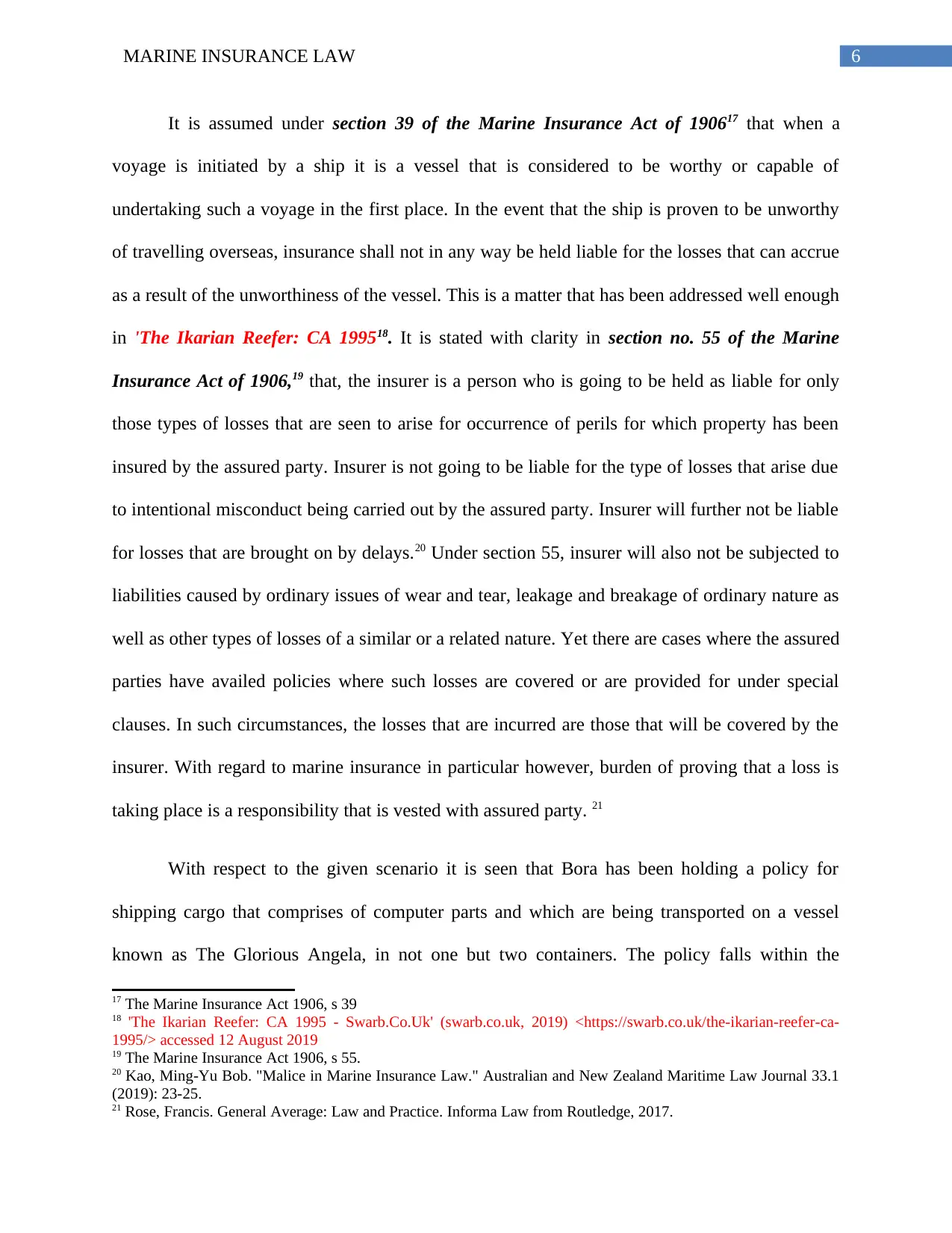
6MARINE INSURANCE LAW
It is assumed under section 39 of the Marine Insurance Act of 190617 that when a
voyage is initiated by a ship it is a vessel that is considered to be worthy or capable of
undertaking such a voyage in the first place. In the event that the ship is proven to be unworthy
of travelling overseas, insurance shall not in any way be held liable for the losses that can accrue
as a result of the unworthiness of the vessel. This is a matter that has been addressed well enough
in 'The Ikarian Reefer: CA 199518. It is stated with clarity in section no. 55 of the Marine
Insurance Act of 1906,19 that, the insurer is a person who is going to be held as liable for only
those types of losses that are seen to arise for occurrence of perils for which property has been
insured by the assured party. Insurer is not going to be liable for the type of losses that arise due
to intentional misconduct being carried out by the assured party. Insurer will further not be liable
for losses that are brought on by delays.20 Under section 55, insurer will also not be subjected to
liabilities caused by ordinary issues of wear and tear, leakage and breakage of ordinary nature as
well as other types of losses of a similar or a related nature. Yet there are cases where the assured
parties have availed policies where such losses are covered or are provided for under special
clauses. In such circumstances, the losses that are incurred are those that will be covered by the
insurer. With regard to marine insurance in particular however, burden of proving that a loss is
taking place is a responsibility that is vested with assured party. 21
With respect to the given scenario it is seen that Bora has been holding a policy for
shipping cargo that comprises of computer parts and which are being transported on a vessel
known as The Glorious Angela, in not one but two containers. The policy falls within the
17 The Marine Insurance Act 1906, s 39
18 'The Ikarian Reefer: CA 1995 - Swarb.Co.Uk' (swarb.co.uk, 2019) <https://swarb.co.uk/the-ikarian-reefer-ca-
1995/> accessed 12 August 2019
19 The Marine Insurance Act 1906, s 55.
20 Kao, Ming-Yu Bob. "Malice in Marine Insurance Law." Australian and New Zealand Maritime Law Journal 33.1
(2019): 23-25.
21 Rose, Francis. General Average: Law and Practice. Informa Law from Routledge, 2017.
It is assumed under section 39 of the Marine Insurance Act of 190617 that when a
voyage is initiated by a ship it is a vessel that is considered to be worthy or capable of
undertaking such a voyage in the first place. In the event that the ship is proven to be unworthy
of travelling overseas, insurance shall not in any way be held liable for the losses that can accrue
as a result of the unworthiness of the vessel. This is a matter that has been addressed well enough
in 'The Ikarian Reefer: CA 199518. It is stated with clarity in section no. 55 of the Marine
Insurance Act of 1906,19 that, the insurer is a person who is going to be held as liable for only
those types of losses that are seen to arise for occurrence of perils for which property has been
insured by the assured party. Insurer is not going to be liable for the type of losses that arise due
to intentional misconduct being carried out by the assured party. Insurer will further not be liable
for losses that are brought on by delays.20 Under section 55, insurer will also not be subjected to
liabilities caused by ordinary issues of wear and tear, leakage and breakage of ordinary nature as
well as other types of losses of a similar or a related nature. Yet there are cases where the assured
parties have availed policies where such losses are covered or are provided for under special
clauses. In such circumstances, the losses that are incurred are those that will be covered by the
insurer. With regard to marine insurance in particular however, burden of proving that a loss is
taking place is a responsibility that is vested with assured party. 21
With respect to the given scenario it is seen that Bora has been holding a policy for
shipping cargo that comprises of computer parts and which are being transported on a vessel
known as The Glorious Angela, in not one but two containers. The policy falls within the
17 The Marine Insurance Act 1906, s 39
18 'The Ikarian Reefer: CA 1995 - Swarb.Co.Uk' (swarb.co.uk, 2019) <https://swarb.co.uk/the-ikarian-reefer-ca-
1995/> accessed 12 August 2019
19 The Marine Insurance Act 1906, s 55.
20 Kao, Ming-Yu Bob. "Malice in Marine Insurance Law." Australian and New Zealand Maritime Law Journal 33.1
(2019): 23-25.
21 Rose, Francis. General Average: Law and Practice. Informa Law from Routledge, 2017.
Paraphrase This Document
Need a fresh take? Get an instant paraphrase of this document with our AI Paraphraser
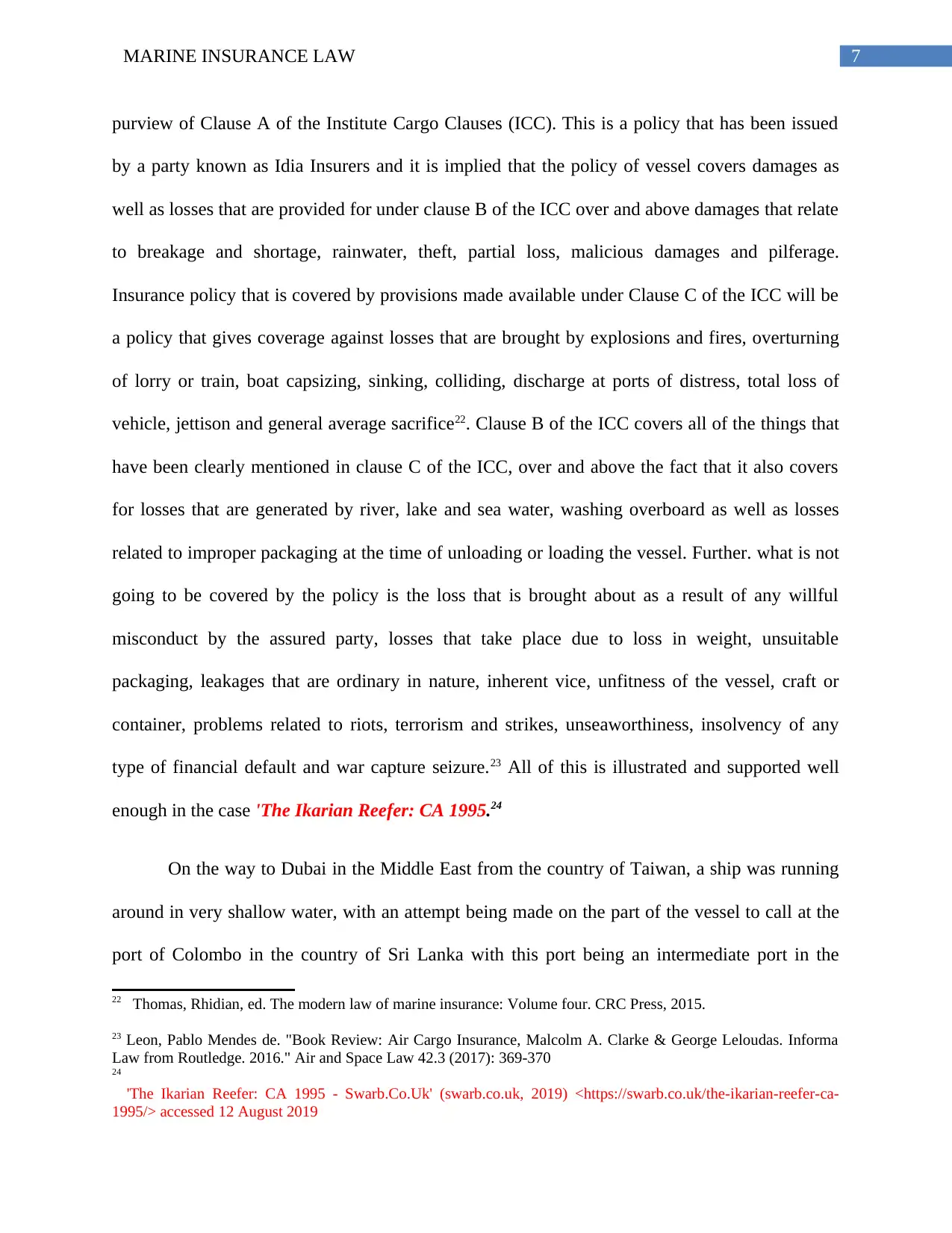
7MARINE INSURANCE LAW
purview of Clause A of the Institute Cargo Clauses (ICC). This is a policy that has been issued
by a party known as Idia Insurers and it is implied that the policy of vessel covers damages as
well as losses that are provided for under clause B of the ICC over and above damages that relate
to breakage and shortage, rainwater, theft, partial loss, malicious damages and pilferage.
Insurance policy that is covered by provisions made available under Clause C of the ICC will be
a policy that gives coverage against losses that are brought by explosions and fires, overturning
of lorry or train, boat capsizing, sinking, colliding, discharge at ports of distress, total loss of
vehicle, jettison and general average sacrifice22. Clause B of the ICC covers all of the things that
have been clearly mentioned in clause C of the ICC, over and above the fact that it also covers
for losses that are generated by river, lake and sea water, washing overboard as well as losses
related to improper packaging at the time of unloading or loading the vessel. Further. what is not
going to be covered by the policy is the loss that is brought about as a result of any willful
misconduct by the assured party, losses that take place due to loss in weight, unsuitable
packaging, leakages that are ordinary in nature, inherent vice, unfitness of the vessel, craft or
container, problems related to riots, terrorism and strikes, unseaworthiness, insolvency of any
type of financial default and war capture seizure.23 All of this is illustrated and supported well
enough in the case 'The Ikarian Reefer: CA 1995.24
On the way to Dubai in the Middle East from the country of Taiwan, a ship was running
around in very shallow water, with an attempt being made on the part of the vessel to call at the
port of Colombo in the country of Sri Lanka with this port being an intermediate port in the
22 Thomas, Rhidian, ed. The modern law of marine insurance: Volume four. CRC Press, 2015.
23 Leon, Pablo Mendes de. "Book Review: Air Cargo Insurance, Malcolm A. Clarke & George Leloudas. Informa
Law from Routledge. 2016." Air and Space Law 42.3 (2017): 369-370
24
'The Ikarian Reefer: CA 1995 - Swarb.Co.Uk' (swarb.co.uk, 2019) <https://swarb.co.uk/the-ikarian-reefer-ca-
1995/> accessed 12 August 2019
purview of Clause A of the Institute Cargo Clauses (ICC). This is a policy that has been issued
by a party known as Idia Insurers and it is implied that the policy of vessel covers damages as
well as losses that are provided for under clause B of the ICC over and above damages that relate
to breakage and shortage, rainwater, theft, partial loss, malicious damages and pilferage.
Insurance policy that is covered by provisions made available under Clause C of the ICC will be
a policy that gives coverage against losses that are brought by explosions and fires, overturning
of lorry or train, boat capsizing, sinking, colliding, discharge at ports of distress, total loss of
vehicle, jettison and general average sacrifice22. Clause B of the ICC covers all of the things that
have been clearly mentioned in clause C of the ICC, over and above the fact that it also covers
for losses that are generated by river, lake and sea water, washing overboard as well as losses
related to improper packaging at the time of unloading or loading the vessel. Further. what is not
going to be covered by the policy is the loss that is brought about as a result of any willful
misconduct by the assured party, losses that take place due to loss in weight, unsuitable
packaging, leakages that are ordinary in nature, inherent vice, unfitness of the vessel, craft or
container, problems related to riots, terrorism and strikes, unseaworthiness, insolvency of any
type of financial default and war capture seizure.23 All of this is illustrated and supported well
enough in the case 'The Ikarian Reefer: CA 1995.24
On the way to Dubai in the Middle East from the country of Taiwan, a ship was running
around in very shallow water, with an attempt being made on the part of the vessel to call at the
port of Colombo in the country of Sri Lanka with this port being an intermediate port in the
22 Thomas, Rhidian, ed. The modern law of marine insurance: Volume four. CRC Press, 2015.
23 Leon, Pablo Mendes de. "Book Review: Air Cargo Insurance, Malcolm A. Clarke & George Leloudas. Informa
Law from Routledge. 2016." Air and Space Law 42.3 (2017): 369-370
24
'The Ikarian Reefer: CA 1995 - Swarb.Co.Uk' (swarb.co.uk, 2019) <https://swarb.co.uk/the-ikarian-reefer-ca-
1995/> accessed 12 August 2019
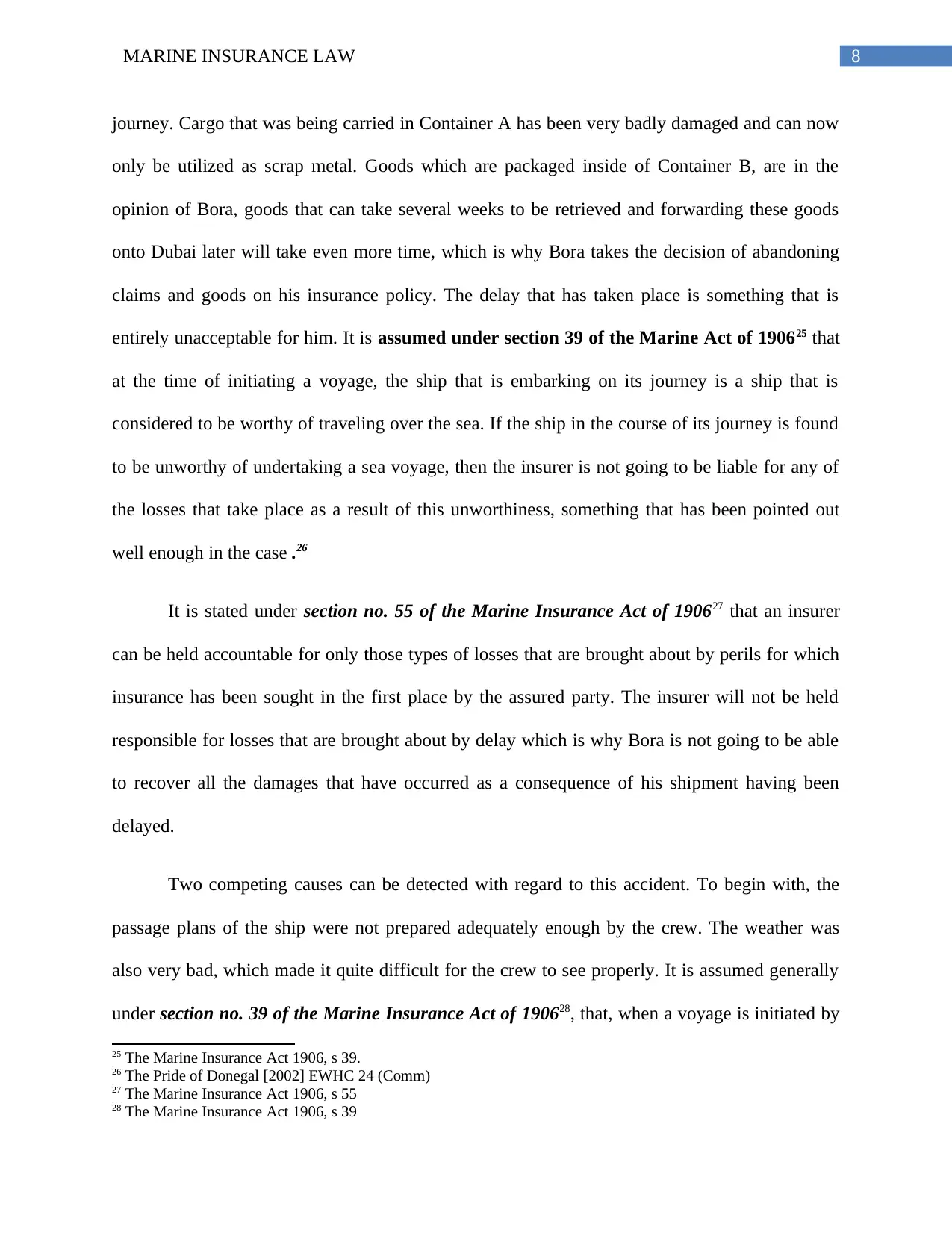
8MARINE INSURANCE LAW
journey. Cargo that was being carried in Container A has been very badly damaged and can now
only be utilized as scrap metal. Goods which are packaged inside of Container B, are in the
opinion of Bora, goods that can take several weeks to be retrieved and forwarding these goods
onto Dubai later will take even more time, which is why Bora takes the decision of abandoning
claims and goods on his insurance policy. The delay that has taken place is something that is
entirely unacceptable for him. It is assumed under section 39 of the Marine Act of 190625 that
at the time of initiating a voyage, the ship that is embarking on its journey is a ship that is
considered to be worthy of traveling over the sea. If the ship in the course of its journey is found
to be unworthy of undertaking a sea voyage, then the insurer is not going to be liable for any of
the losses that take place as a result of this unworthiness, something that has been pointed out
well enough in the case .26
It is stated under section no. 55 of the Marine Insurance Act of 190627 that an insurer
can be held accountable for only those types of losses that are brought about by perils for which
insurance has been sought in the first place by the assured party. The insurer will not be held
responsible for losses that are brought about by delay which is why Bora is not going to be able
to recover all the damages that have occurred as a consequence of his shipment having been
delayed.
Two competing causes can be detected with regard to this accident. To begin with, the
passage plans of the ship were not prepared adequately enough by the crew. The weather was
also very bad, which made it quite difficult for the crew to see properly. It is assumed generally
under section no. 39 of the Marine Insurance Act of 190628, that, when a voyage is initiated by
25 The Marine Insurance Act 1906, s 39.
26 The Pride of Donegal [2002] EWHC 24 (Comm)
27 The Marine Insurance Act 1906, s 55
28 The Marine Insurance Act 1906, s 39
journey. Cargo that was being carried in Container A has been very badly damaged and can now
only be utilized as scrap metal. Goods which are packaged inside of Container B, are in the
opinion of Bora, goods that can take several weeks to be retrieved and forwarding these goods
onto Dubai later will take even more time, which is why Bora takes the decision of abandoning
claims and goods on his insurance policy. The delay that has taken place is something that is
entirely unacceptable for him. It is assumed under section 39 of the Marine Act of 190625 that
at the time of initiating a voyage, the ship that is embarking on its journey is a ship that is
considered to be worthy of traveling over the sea. If the ship in the course of its journey is found
to be unworthy of undertaking a sea voyage, then the insurer is not going to be liable for any of
the losses that take place as a result of this unworthiness, something that has been pointed out
well enough in the case .26
It is stated under section no. 55 of the Marine Insurance Act of 190627 that an insurer
can be held accountable for only those types of losses that are brought about by perils for which
insurance has been sought in the first place by the assured party. The insurer will not be held
responsible for losses that are brought about by delay which is why Bora is not going to be able
to recover all the damages that have occurred as a consequence of his shipment having been
delayed.
Two competing causes can be detected with regard to this accident. To begin with, the
passage plans of the ship were not prepared adequately enough by the crew. The weather was
also very bad, which made it quite difficult for the crew to see properly. It is assumed generally
under section no. 39 of the Marine Insurance Act of 190628, that, when a voyage is initiated by
25 The Marine Insurance Act 1906, s 39.
26 The Pride of Donegal [2002] EWHC 24 (Comm)
27 The Marine Insurance Act 1906, s 55
28 The Marine Insurance Act 1906, s 39
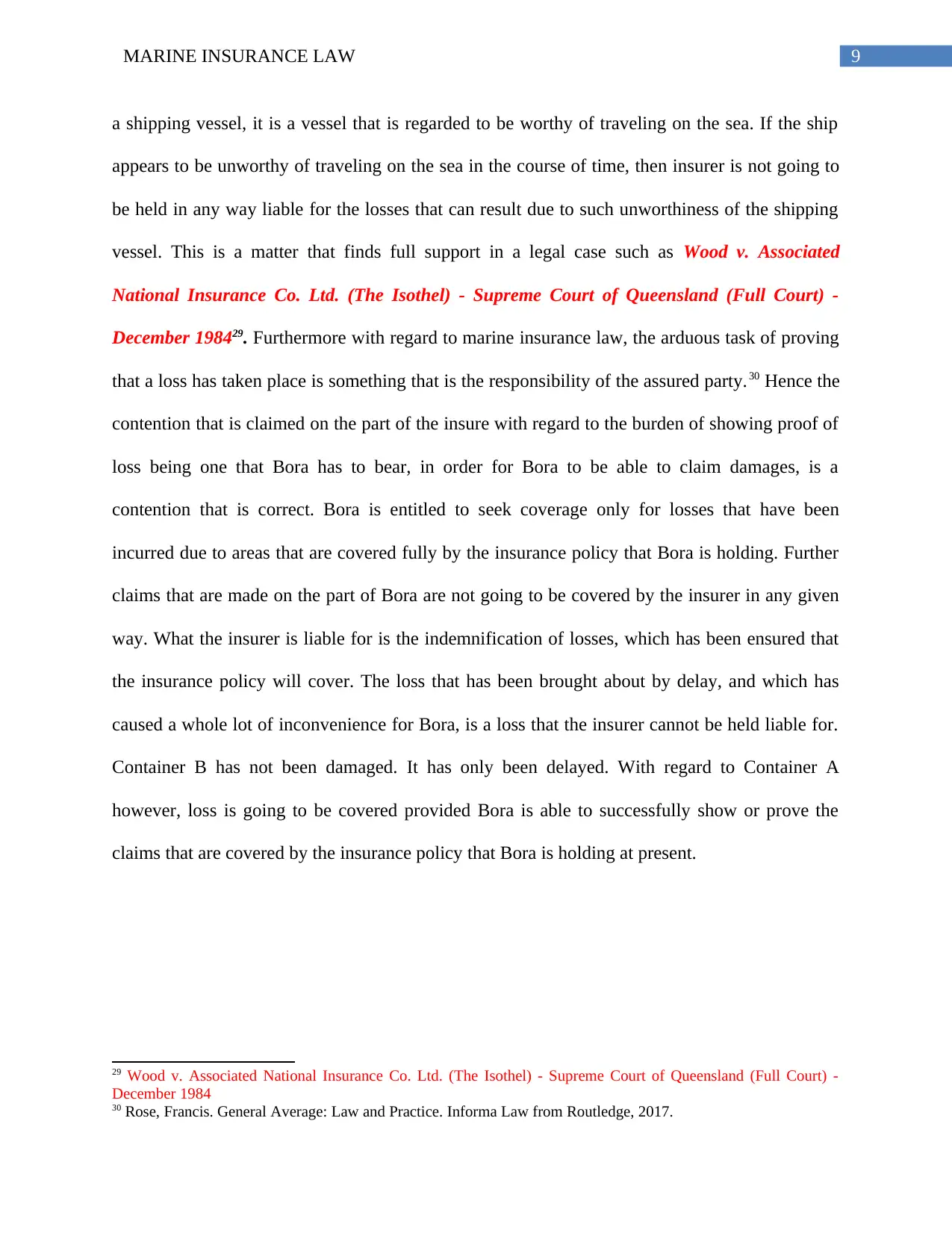
9MARINE INSURANCE LAW
a shipping vessel, it is a vessel that is regarded to be worthy of traveling on the sea. If the ship
appears to be unworthy of traveling on the sea in the course of time, then insurer is not going to
be held in any way liable for the losses that can result due to such unworthiness of the shipping
vessel. This is a matter that finds full support in a legal case such as Wood v. Associated
National Insurance Co. Ltd. (The Isothel) - Supreme Court of Queensland (Full Court) -
December 198429. Furthermore with regard to marine insurance law, the arduous task of proving
that a loss has taken place is something that is the responsibility of the assured party.30 Hence the
contention that is claimed on the part of the insure with regard to the burden of showing proof of
loss being one that Bora has to bear, in order for Bora to be able to claim damages, is a
contention that is correct. Bora is entitled to seek coverage only for losses that have been
incurred due to areas that are covered fully by the insurance policy that Bora is holding. Further
claims that are made on the part of Bora are not going to be covered by the insurer in any given
way. What the insurer is liable for is the indemnification of losses, which has been ensured that
the insurance policy will cover. The loss that has been brought about by delay, and which has
caused a whole lot of inconvenience for Bora, is a loss that the insurer cannot be held liable for.
Container B has not been damaged. It has only been delayed. With regard to Container A
however, loss is going to be covered provided Bora is able to successfully show or prove the
claims that are covered by the insurance policy that Bora is holding at present.
29 Wood v. Associated National Insurance Co. Ltd. (The Isothel) - Supreme Court of Queensland (Full Court) -
December 1984
30 Rose, Francis. General Average: Law and Practice. Informa Law from Routledge, 2017.
a shipping vessel, it is a vessel that is regarded to be worthy of traveling on the sea. If the ship
appears to be unworthy of traveling on the sea in the course of time, then insurer is not going to
be held in any way liable for the losses that can result due to such unworthiness of the shipping
vessel. This is a matter that finds full support in a legal case such as Wood v. Associated
National Insurance Co. Ltd. (The Isothel) - Supreme Court of Queensland (Full Court) -
December 198429. Furthermore with regard to marine insurance law, the arduous task of proving
that a loss has taken place is something that is the responsibility of the assured party.30 Hence the
contention that is claimed on the part of the insure with regard to the burden of showing proof of
loss being one that Bora has to bear, in order for Bora to be able to claim damages, is a
contention that is correct. Bora is entitled to seek coverage only for losses that have been
incurred due to areas that are covered fully by the insurance policy that Bora is holding. Further
claims that are made on the part of Bora are not going to be covered by the insurer in any given
way. What the insurer is liable for is the indemnification of losses, which has been ensured that
the insurance policy will cover. The loss that has been brought about by delay, and which has
caused a whole lot of inconvenience for Bora, is a loss that the insurer cannot be held liable for.
Container B has not been damaged. It has only been delayed. With regard to Container A
however, loss is going to be covered provided Bora is able to successfully show or prove the
claims that are covered by the insurance policy that Bora is holding at present.
29 Wood v. Associated National Insurance Co. Ltd. (The Isothel) - Supreme Court of Queensland (Full Court) -
December 1984
30 Rose, Francis. General Average: Law and Practice. Informa Law from Routledge, 2017.
Secure Best Marks with AI Grader
Need help grading? Try our AI Grader for instant feedback on your assignments.
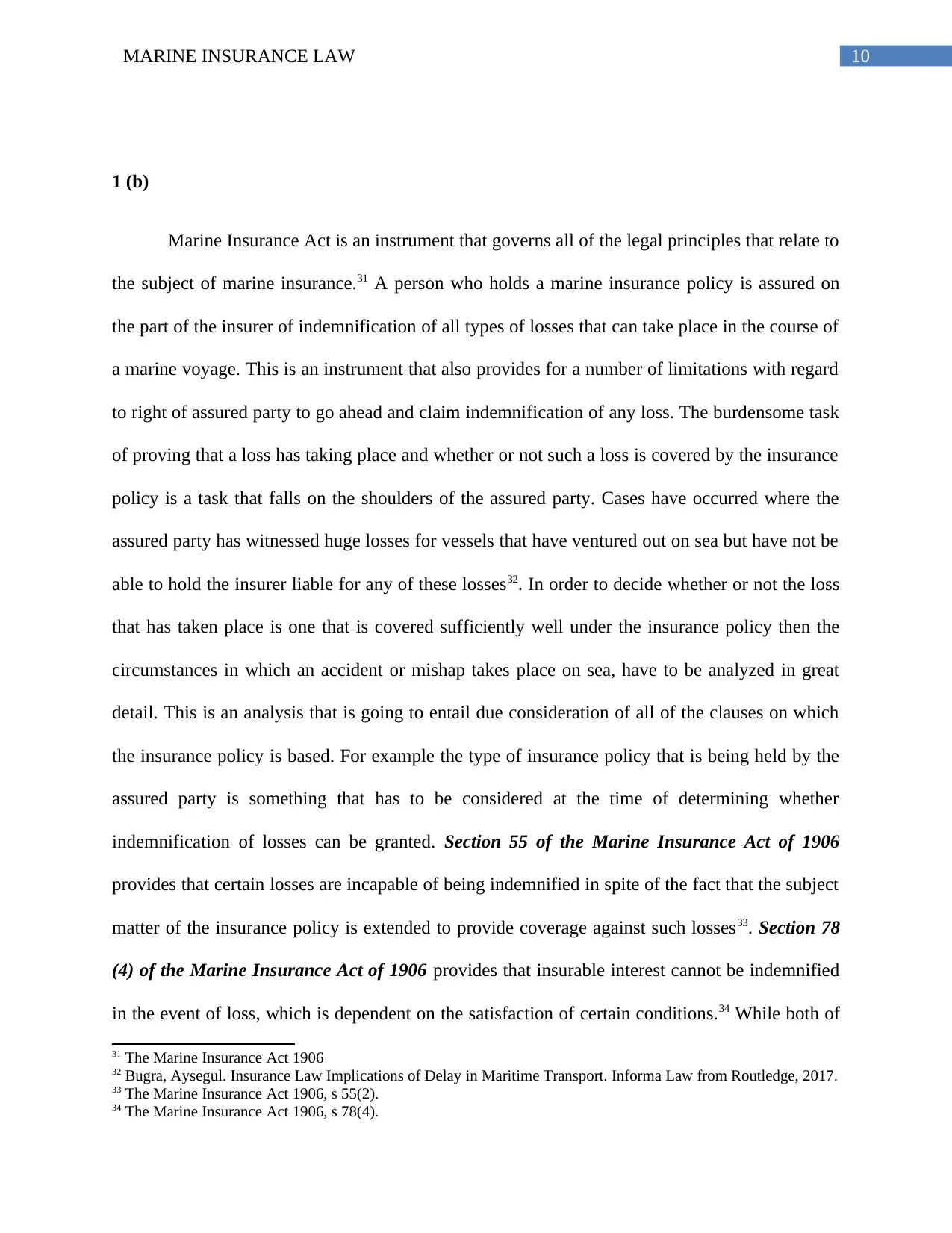
10MARINE INSURANCE LAW
1 (b)
Marine Insurance Act is an instrument that governs all of the legal principles that relate to
the subject of marine insurance.31 A person who holds a marine insurance policy is assured on
the part of the insurer of indemnification of all types of losses that can take place in the course of
a marine voyage. This is an instrument that also provides for a number of limitations with regard
to right of assured party to go ahead and claim indemnification of any loss. The burdensome task
of proving that a loss has taking place and whether or not such a loss is covered by the insurance
policy is a task that falls on the shoulders of the assured party. Cases have occurred where the
assured party has witnessed huge losses for vessels that have ventured out on sea but have not be
able to hold the insurer liable for any of these losses32. In order to decide whether or not the loss
that has taken place is one that is covered sufficiently well under the insurance policy then the
circumstances in which an accident or mishap takes place on sea, have to be analyzed in great
detail. This is an analysis that is going to entail due consideration of all of the clauses on which
the insurance policy is based. For example the type of insurance policy that is being held by the
assured party is something that has to be considered at the time of determining whether
indemnification of losses can be granted. Section 55 of the Marine Insurance Act of 1906
provides that certain losses are incapable of being indemnified in spite of the fact that the subject
matter of the insurance policy is extended to provide coverage against such losses33. Section 78
(4) of the Marine Insurance Act of 1906 provides that insurable interest cannot be indemnified
in the event of loss, which is dependent on the satisfaction of certain conditions.34 While both of
31 The Marine Insurance Act 1906
32 Bugra, Aysegul. Insurance Law Implications of Delay in Maritime Transport. Informa Law from Routledge, 2017.
33 The Marine Insurance Act 1906, s 55(2).
34 The Marine Insurance Act 1906, s 78(4).
1 (b)
Marine Insurance Act is an instrument that governs all of the legal principles that relate to
the subject of marine insurance.31 A person who holds a marine insurance policy is assured on
the part of the insurer of indemnification of all types of losses that can take place in the course of
a marine voyage. This is an instrument that also provides for a number of limitations with regard
to right of assured party to go ahead and claim indemnification of any loss. The burdensome task
of proving that a loss has taking place and whether or not such a loss is covered by the insurance
policy is a task that falls on the shoulders of the assured party. Cases have occurred where the
assured party has witnessed huge losses for vessels that have ventured out on sea but have not be
able to hold the insurer liable for any of these losses32. In order to decide whether or not the loss
that has taken place is one that is covered sufficiently well under the insurance policy then the
circumstances in which an accident or mishap takes place on sea, have to be analyzed in great
detail. This is an analysis that is going to entail due consideration of all of the clauses on which
the insurance policy is based. For example the type of insurance policy that is being held by the
assured party is something that has to be considered at the time of determining whether
indemnification of losses can be granted. Section 55 of the Marine Insurance Act of 1906
provides that certain losses are incapable of being indemnified in spite of the fact that the subject
matter of the insurance policy is extended to provide coverage against such losses33. Section 78
(4) of the Marine Insurance Act of 1906 provides that insurable interest cannot be indemnified
in the event of loss, which is dependent on the satisfaction of certain conditions.34 While both of
31 The Marine Insurance Act 1906
32 Bugra, Aysegul. Insurance Law Implications of Delay in Maritime Transport. Informa Law from Routledge, 2017.
33 The Marine Insurance Act 1906, s 55(2).
34 The Marine Insurance Act 1906, s 78(4).
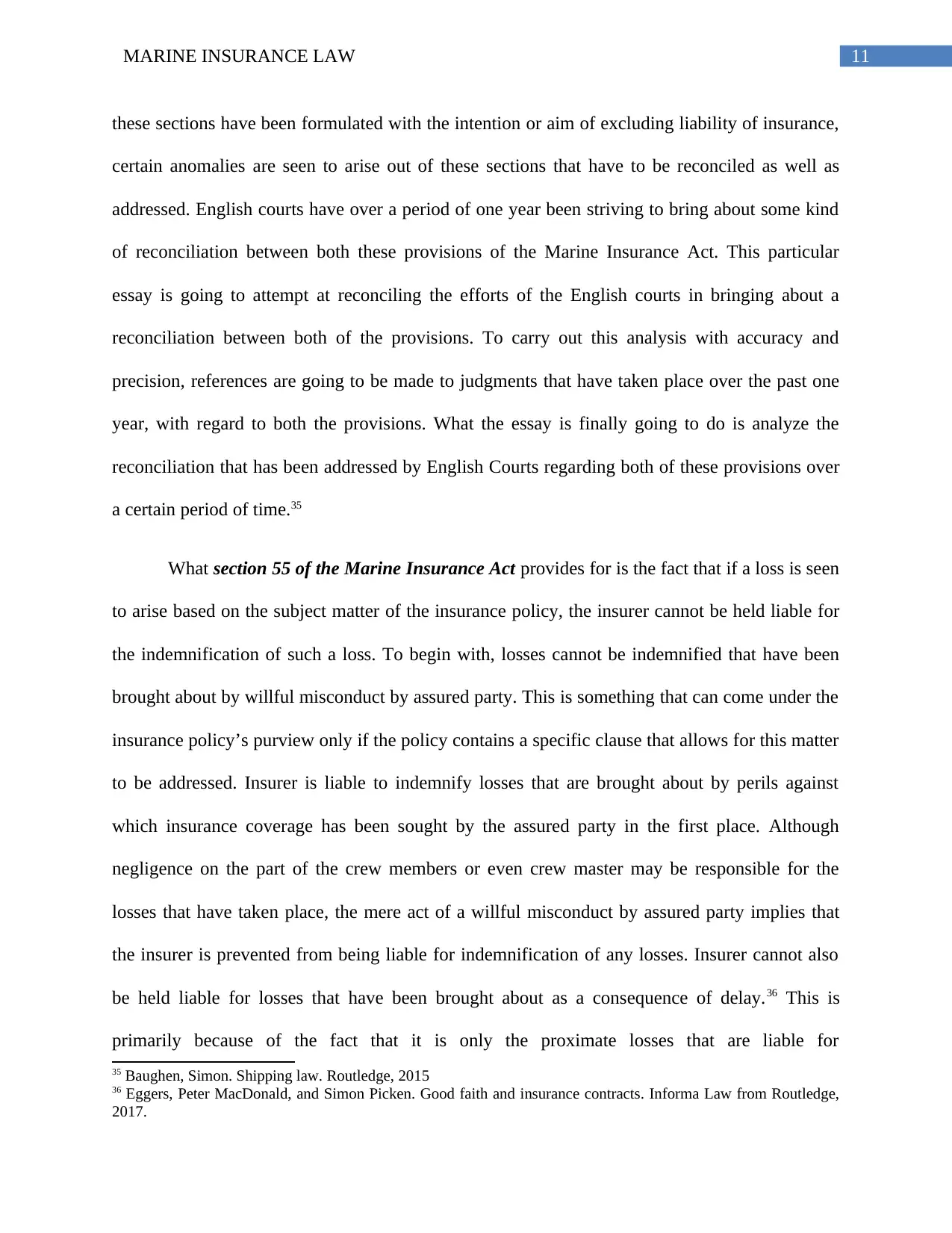
11MARINE INSURANCE LAW
these sections have been formulated with the intention or aim of excluding liability of insurance,
certain anomalies are seen to arise out of these sections that have to be reconciled as well as
addressed. English courts have over a period of one year been striving to bring about some kind
of reconciliation between both these provisions of the Marine Insurance Act. This particular
essay is going to attempt at reconciling the efforts of the English courts in bringing about a
reconciliation between both of the provisions. To carry out this analysis with accuracy and
precision, references are going to be made to judgments that have taken place over the past one
year, with regard to both the provisions. What the essay is finally going to do is analyze the
reconciliation that has been addressed by English Courts regarding both of these provisions over
a certain period of time.35
What section 55 of the Marine Insurance Act provides for is the fact that if a loss is seen
to arise based on the subject matter of the insurance policy, the insurer cannot be held liable for
the indemnification of such a loss. To begin with, losses cannot be indemnified that have been
brought about by willful misconduct by assured party. This is something that can come under the
insurance policy’s purview only if the policy contains a specific clause that allows for this matter
to be addressed. Insurer is liable to indemnify losses that are brought about by perils against
which insurance coverage has been sought by the assured party in the first place. Although
negligence on the part of the crew members or even crew master may be responsible for the
losses that have taken place, the mere act of a willful misconduct by assured party implies that
the insurer is prevented from being liable for indemnification of any losses. Insurer cannot also
be held liable for losses that have been brought about as a consequence of delay.36 This is
primarily because of the fact that it is only the proximate losses that are liable for
35 Baughen, Simon. Shipping law. Routledge, 2015
36 Eggers, Peter MacDonald, and Simon Picken. Good faith and insurance contracts. Informa Law from Routledge,
2017.
these sections have been formulated with the intention or aim of excluding liability of insurance,
certain anomalies are seen to arise out of these sections that have to be reconciled as well as
addressed. English courts have over a period of one year been striving to bring about some kind
of reconciliation between both these provisions of the Marine Insurance Act. This particular
essay is going to attempt at reconciling the efforts of the English courts in bringing about a
reconciliation between both of the provisions. To carry out this analysis with accuracy and
precision, references are going to be made to judgments that have taken place over the past one
year, with regard to both the provisions. What the essay is finally going to do is analyze the
reconciliation that has been addressed by English Courts regarding both of these provisions over
a certain period of time.35
What section 55 of the Marine Insurance Act provides for is the fact that if a loss is seen
to arise based on the subject matter of the insurance policy, the insurer cannot be held liable for
the indemnification of such a loss. To begin with, losses cannot be indemnified that have been
brought about by willful misconduct by assured party. This is something that can come under the
insurance policy’s purview only if the policy contains a specific clause that allows for this matter
to be addressed. Insurer is liable to indemnify losses that are brought about by perils against
which insurance coverage has been sought by the assured party in the first place. Although
negligence on the part of the crew members or even crew master may be responsible for the
losses that have taken place, the mere act of a willful misconduct by assured party implies that
the insurer is prevented from being liable for indemnification of any losses. Insurer cannot also
be held liable for losses that have been brought about as a consequence of delay.36 This is
primarily because of the fact that it is only the proximate losses that are liable for
35 Baughen, Simon. Shipping law. Routledge, 2015
36 Eggers, Peter MacDonald, and Simon Picken. Good faith and insurance contracts. Informa Law from Routledge,
2017.
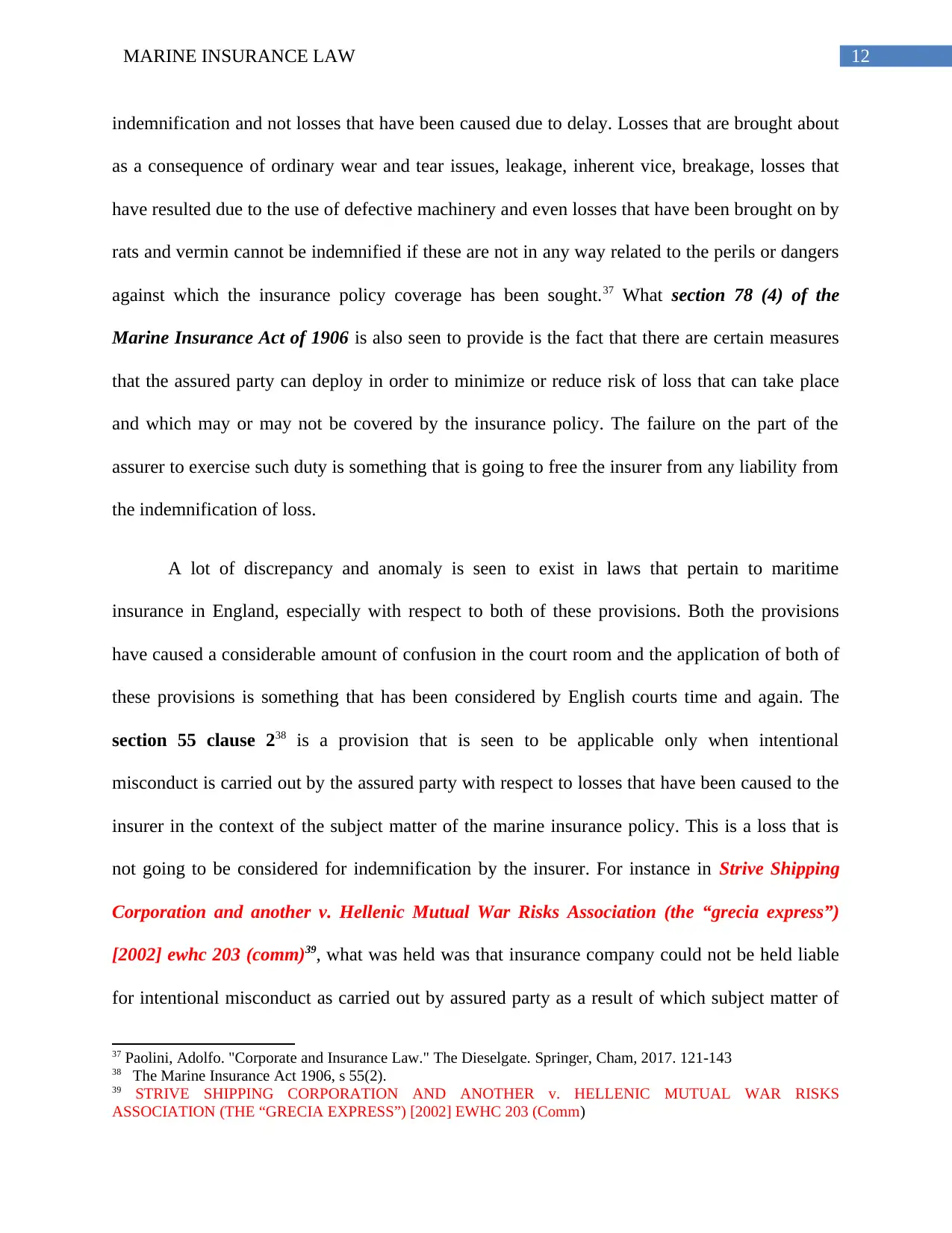
12MARINE INSURANCE LAW
indemnification and not losses that have been caused due to delay. Losses that are brought about
as a consequence of ordinary wear and tear issues, leakage, inherent vice, breakage, losses that
have resulted due to the use of defective machinery and even losses that have been brought on by
rats and vermin cannot be indemnified if these are not in any way related to the perils or dangers
against which the insurance policy coverage has been sought.37 What section 78 (4) of the
Marine Insurance Act of 1906 is also seen to provide is the fact that there are certain measures
that the assured party can deploy in order to minimize or reduce risk of loss that can take place
and which may or may not be covered by the insurance policy. The failure on the part of the
assurer to exercise such duty is something that is going to free the insurer from any liability from
the indemnification of loss.
A lot of discrepancy and anomaly is seen to exist in laws that pertain to maritime
insurance in England, especially with respect to both of these provisions. Both the provisions
have caused a considerable amount of confusion in the court room and the application of both of
these provisions is something that has been considered by English courts time and again. The
section 55 clause 238 is a provision that is seen to be applicable only when intentional
misconduct is carried out by the assured party with respect to losses that have been caused to the
insurer in the context of the subject matter of the marine insurance policy. This is a loss that is
not going to be considered for indemnification by the insurer. For instance in Strive Shipping
Corporation and another v. Hellenic Mutual War Risks Association (the “grecia express”)
[2002] ewhc 203 (comm)39, what was held was that insurance company could not be held liable
for intentional misconduct as carried out by assured party as a result of which subject matter of
37 Paolini, Adolfo. "Corporate and Insurance Law." The Dieselgate. Springer, Cham, 2017. 121-143
38 The Marine Insurance Act 1906, s 55(2).
39 STRIVE SHIPPING CORPORATION AND ANOTHER v. HELLENIC MUTUAL WAR RISKS
ASSOCIATION (THE “GRECIA EXPRESS”) [2002] EWHC 203 (Comm)
indemnification and not losses that have been caused due to delay. Losses that are brought about
as a consequence of ordinary wear and tear issues, leakage, inherent vice, breakage, losses that
have resulted due to the use of defective machinery and even losses that have been brought on by
rats and vermin cannot be indemnified if these are not in any way related to the perils or dangers
against which the insurance policy coverage has been sought.37 What section 78 (4) of the
Marine Insurance Act of 1906 is also seen to provide is the fact that there are certain measures
that the assured party can deploy in order to minimize or reduce risk of loss that can take place
and which may or may not be covered by the insurance policy. The failure on the part of the
assurer to exercise such duty is something that is going to free the insurer from any liability from
the indemnification of loss.
A lot of discrepancy and anomaly is seen to exist in laws that pertain to maritime
insurance in England, especially with respect to both of these provisions. Both the provisions
have caused a considerable amount of confusion in the court room and the application of both of
these provisions is something that has been considered by English courts time and again. The
section 55 clause 238 is a provision that is seen to be applicable only when intentional
misconduct is carried out by the assured party with respect to losses that have been caused to the
insurer in the context of the subject matter of the marine insurance policy. This is a loss that is
not going to be considered for indemnification by the insurer. For instance in Strive Shipping
Corporation and another v. Hellenic Mutual War Risks Association (the “grecia express”)
[2002] ewhc 203 (comm)39, what was held was that insurance company could not be held liable
for intentional misconduct as carried out by assured party as a result of which subject matter of
37 Paolini, Adolfo. "Corporate and Insurance Law." The Dieselgate. Springer, Cham, 2017. 121-143
38 The Marine Insurance Act 1906, s 55(2).
39 STRIVE SHIPPING CORPORATION AND ANOTHER v. HELLENIC MUTUAL WAR RISKS
ASSOCIATION (THE “GRECIA EXPRESS”) [2002] EWHC 203 (Comm)
Paraphrase This Document
Need a fresh take? Get an instant paraphrase of this document with our AI Paraphraser
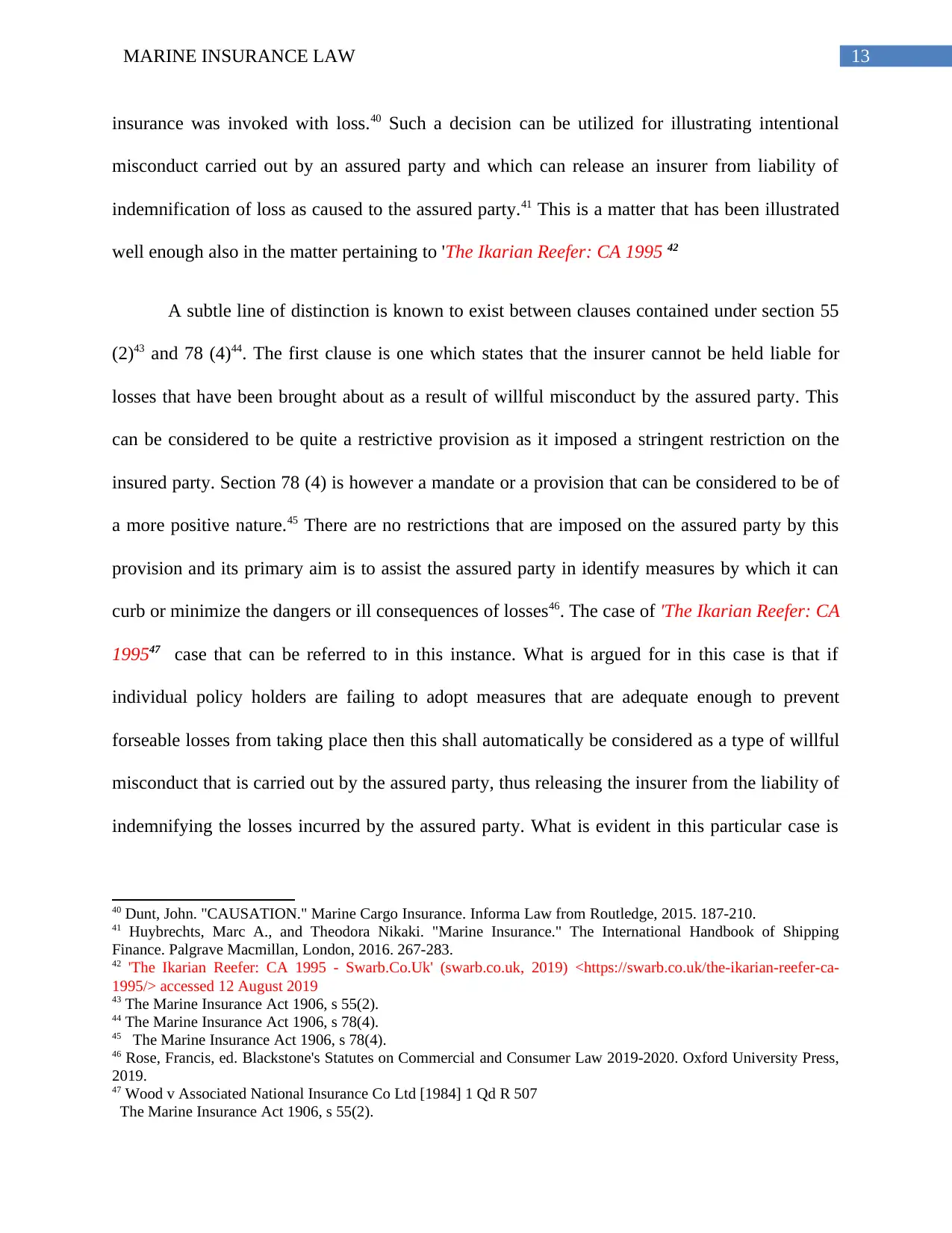
13MARINE INSURANCE LAW
insurance was invoked with loss.40 Such a decision can be utilized for illustrating intentional
misconduct carried out by an assured party and which can release an insurer from liability of
indemnification of loss as caused to the assured party.41 This is a matter that has been illustrated
well enough also in the matter pertaining to 'The Ikarian Reefer: CA 1995 42
A subtle line of distinction is known to exist between clauses contained under section 55
(2)43 and 78 (4)44. The first clause is one which states that the insurer cannot be held liable for
losses that have been brought about as a result of willful misconduct by the assured party. This
can be considered to be quite a restrictive provision as it imposed a stringent restriction on the
insured party. Section 78 (4) is however a mandate or a provision that can be considered to be of
a more positive nature.45 There are no restrictions that are imposed on the assured party by this
provision and its primary aim is to assist the assured party in identify measures by which it can
curb or minimize the dangers or ill consequences of losses46. The case of 'The Ikarian Reefer: CA
199547 case that can be referred to in this instance. What is argued for in this case is that if
individual policy holders are failing to adopt measures that are adequate enough to prevent
forseable losses from taking place then this shall automatically be considered as a type of willful
misconduct that is carried out by the assured party, thus releasing the insurer from the liability of
indemnifying the losses incurred by the assured party. What is evident in this particular case is
40 Dunt, John. "CAUSATION." Marine Cargo Insurance. Informa Law from Routledge, 2015. 187-210.
41 Huybrechts, Marc A., and Theodora Nikaki. "Marine Insurance." The International Handbook of Shipping
Finance. Palgrave Macmillan, London, 2016. 267-283.
42 'The Ikarian Reefer: CA 1995 - Swarb.Co.Uk' (swarb.co.uk, 2019) <https://swarb.co.uk/the-ikarian-reefer-ca-
1995/> accessed 12 August 2019
43 The Marine Insurance Act 1906, s 55(2).
44 The Marine Insurance Act 1906, s 78(4).
45 The Marine Insurance Act 1906, s 78(4).
46 Rose, Francis, ed. Blackstone's Statutes on Commercial and Consumer Law 2019-2020. Oxford University Press,
2019.
47 Wood v Associated National Insurance Co Ltd [1984] 1 Qd R 507
The Marine Insurance Act 1906, s 55(2).
insurance was invoked with loss.40 Such a decision can be utilized for illustrating intentional
misconduct carried out by an assured party and which can release an insurer from liability of
indemnification of loss as caused to the assured party.41 This is a matter that has been illustrated
well enough also in the matter pertaining to 'The Ikarian Reefer: CA 1995 42
A subtle line of distinction is known to exist between clauses contained under section 55
(2)43 and 78 (4)44. The first clause is one which states that the insurer cannot be held liable for
losses that have been brought about as a result of willful misconduct by the assured party. This
can be considered to be quite a restrictive provision as it imposed a stringent restriction on the
insured party. Section 78 (4) is however a mandate or a provision that can be considered to be of
a more positive nature.45 There are no restrictions that are imposed on the assured party by this
provision and its primary aim is to assist the assured party in identify measures by which it can
curb or minimize the dangers or ill consequences of losses46. The case of 'The Ikarian Reefer: CA
199547 case that can be referred to in this instance. What is argued for in this case is that if
individual policy holders are failing to adopt measures that are adequate enough to prevent
forseable losses from taking place then this shall automatically be considered as a type of willful
misconduct that is carried out by the assured party, thus releasing the insurer from the liability of
indemnifying the losses incurred by the assured party. What is evident in this particular case is
40 Dunt, John. "CAUSATION." Marine Cargo Insurance. Informa Law from Routledge, 2015. 187-210.
41 Huybrechts, Marc A., and Theodora Nikaki. "Marine Insurance." The International Handbook of Shipping
Finance. Palgrave Macmillan, London, 2016. 267-283.
42 'The Ikarian Reefer: CA 1995 - Swarb.Co.Uk' (swarb.co.uk, 2019) <https://swarb.co.uk/the-ikarian-reefer-ca-
1995/> accessed 12 August 2019
43 The Marine Insurance Act 1906, s 55(2).
44 The Marine Insurance Act 1906, s 78(4).
45 The Marine Insurance Act 1906, s 78(4).
46 Rose, Francis, ed. Blackstone's Statutes on Commercial and Consumer Law 2019-2020. Oxford University Press,
2019.
47 Wood v Associated National Insurance Co Ltd [1984] 1 Qd R 507
The Marine Insurance Act 1906, s 55(2).
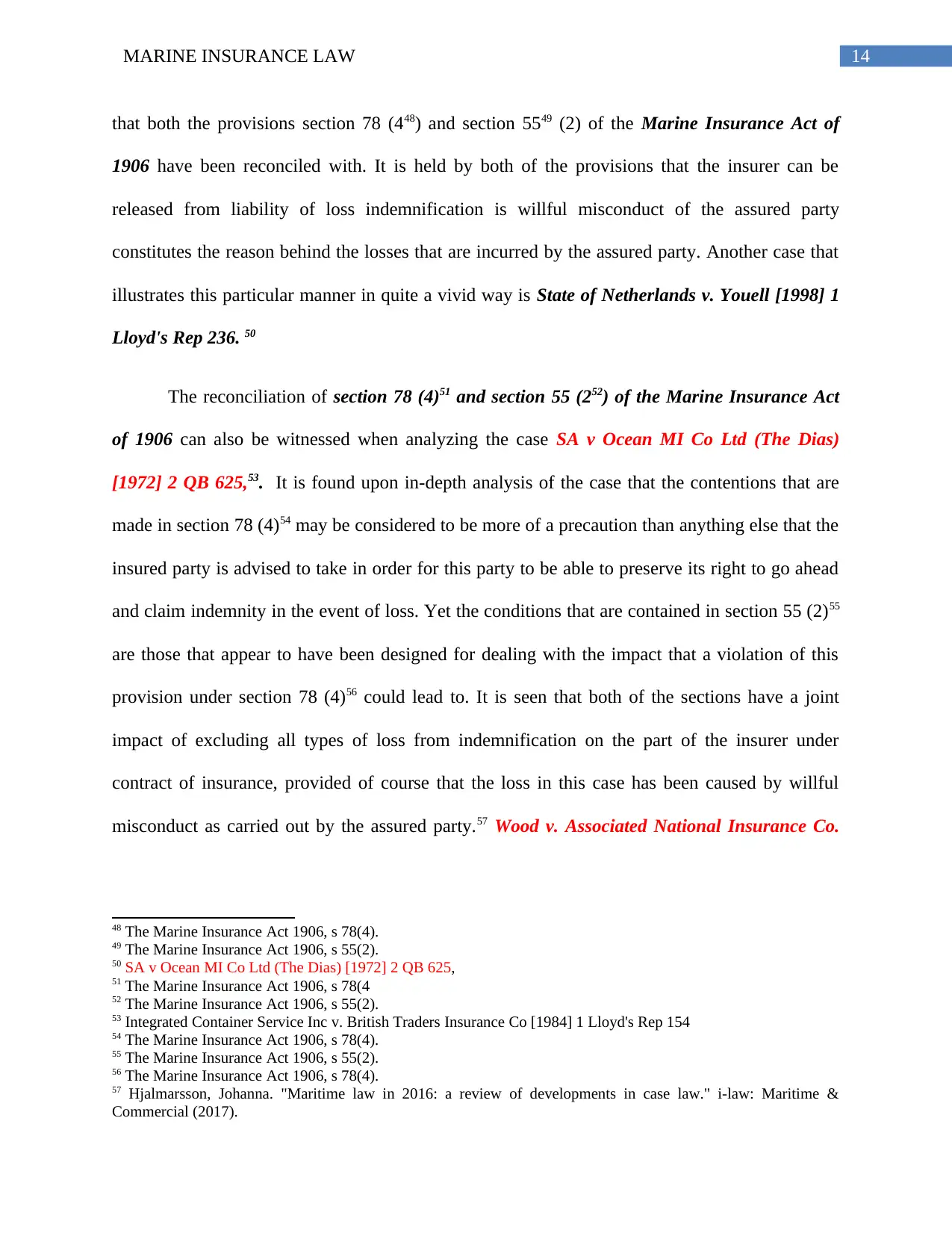
14MARINE INSURANCE LAW
that both the provisions section 78 (448) and section 5549 (2) of the Marine Insurance Act of
1906 have been reconciled with. It is held by both of the provisions that the insurer can be
released from liability of loss indemnification is willful misconduct of the assured party
constitutes the reason behind the losses that are incurred by the assured party. Another case that
illustrates this particular manner in quite a vivid way is State of Netherlands v. Youell [1998] 1
Lloyd's Rep 236. 50
The reconciliation of section 78 (4)51 and section 55 (252) of the Marine Insurance Act
of 1906 can also be witnessed when analyzing the case SA v Ocean MI Co Ltd (The Dias)
[1972] 2 QB 625,53. It is found upon in-depth analysis of the case that the contentions that are
made in section 78 (4)54 may be considered to be more of a precaution than anything else that the
insured party is advised to take in order for this party to be able to preserve its right to go ahead
and claim indemnity in the event of loss. Yet the conditions that are contained in section 55 (2)55
are those that appear to have been designed for dealing with the impact that a violation of this
provision under section 78 (4)56 could lead to. It is seen that both of the sections have a joint
impact of excluding all types of loss from indemnification on the part of the insurer under
contract of insurance, provided of course that the loss in this case has been caused by willful
misconduct as carried out by the assured party.57 Wood v. Associated National Insurance Co.
48 The Marine Insurance Act 1906, s 78(4).
49 The Marine Insurance Act 1906, s 55(2).
50 SA v Ocean MI Co Ltd (The Dias) [1972] 2 QB 625,
51 The Marine Insurance Act 1906, s 78(4
52 The Marine Insurance Act 1906, s 55(2).
53 Integrated Container Service Inc v. British Traders Insurance Co [1984] 1 Lloyd's Rep 154
54 The Marine Insurance Act 1906, s 78(4).
55 The Marine Insurance Act 1906, s 55(2).
56 The Marine Insurance Act 1906, s 78(4).
57 Hjalmarsson, Johanna. "Maritime law in 2016: a review of developments in case law." i-law: Maritime &
Commercial (2017).
that both the provisions section 78 (448) and section 5549 (2) of the Marine Insurance Act of
1906 have been reconciled with. It is held by both of the provisions that the insurer can be
released from liability of loss indemnification is willful misconduct of the assured party
constitutes the reason behind the losses that are incurred by the assured party. Another case that
illustrates this particular manner in quite a vivid way is State of Netherlands v. Youell [1998] 1
Lloyd's Rep 236. 50
The reconciliation of section 78 (4)51 and section 55 (252) of the Marine Insurance Act
of 1906 can also be witnessed when analyzing the case SA v Ocean MI Co Ltd (The Dias)
[1972] 2 QB 625,53. It is found upon in-depth analysis of the case that the contentions that are
made in section 78 (4)54 may be considered to be more of a precaution than anything else that the
insured party is advised to take in order for this party to be able to preserve its right to go ahead
and claim indemnity in the event of loss. Yet the conditions that are contained in section 55 (2)55
are those that appear to have been designed for dealing with the impact that a violation of this
provision under section 78 (4)56 could lead to. It is seen that both of the sections have a joint
impact of excluding all types of loss from indemnification on the part of the insurer under
contract of insurance, provided of course that the loss in this case has been caused by willful
misconduct as carried out by the assured party.57 Wood v. Associated National Insurance Co.
48 The Marine Insurance Act 1906, s 78(4).
49 The Marine Insurance Act 1906, s 55(2).
50 SA v Ocean MI Co Ltd (The Dias) [1972] 2 QB 625,
51 The Marine Insurance Act 1906, s 78(4
52 The Marine Insurance Act 1906, s 55(2).
53 Integrated Container Service Inc v. British Traders Insurance Co [1984] 1 Lloyd's Rep 154
54 The Marine Insurance Act 1906, s 78(4).
55 The Marine Insurance Act 1906, s 55(2).
56 The Marine Insurance Act 1906, s 78(4).
57 Hjalmarsson, Johanna. "Maritime law in 2016: a review of developments in case law." i-law: Maritime &
Commercial (2017).
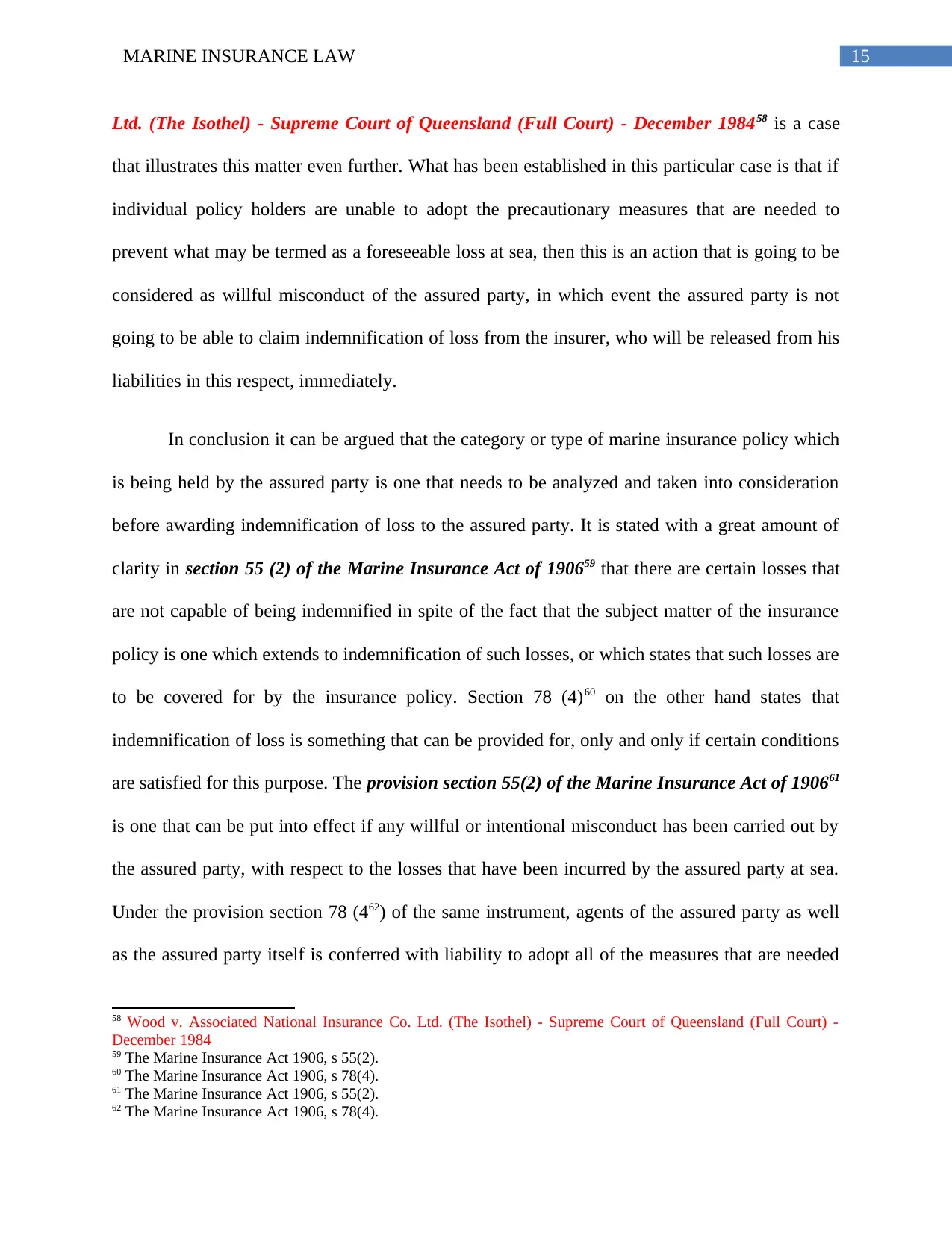
15MARINE INSURANCE LAW
Ltd. (The Isothel) - Supreme Court of Queensland (Full Court) - December 198458 is a case
that illustrates this matter even further. What has been established in this particular case is that if
individual policy holders are unable to adopt the precautionary measures that are needed to
prevent what may be termed as a foreseeable loss at sea, then this is an action that is going to be
considered as willful misconduct of the assured party, in which event the assured party is not
going to be able to claim indemnification of loss from the insurer, who will be released from his
liabilities in this respect, immediately.
In conclusion it can be argued that the category or type of marine insurance policy which
is being held by the assured party is one that needs to be analyzed and taken into consideration
before awarding indemnification of loss to the assured party. It is stated with a great amount of
clarity in section 55 (2) of the Marine Insurance Act of 190659 that there are certain losses that
are not capable of being indemnified in spite of the fact that the subject matter of the insurance
policy is one which extends to indemnification of such losses, or which states that such losses are
to be covered for by the insurance policy. Section 78 (4)60 on the other hand states that
indemnification of loss is something that can be provided for, only and only if certain conditions
are satisfied for this purpose. The provision section 55(2) of the Marine Insurance Act of 190661
is one that can be put into effect if any willful or intentional misconduct has been carried out by
the assured party, with respect to the losses that have been incurred by the assured party at sea.
Under the provision section 78 (462) of the same instrument, agents of the assured party as well
as the assured party itself is conferred with liability to adopt all of the measures that are needed
58 Wood v. Associated National Insurance Co. Ltd. (The Isothel) - Supreme Court of Queensland (Full Court) -
December 1984
59 The Marine Insurance Act 1906, s 55(2).
60 The Marine Insurance Act 1906, s 78(4).
61 The Marine Insurance Act 1906, s 55(2).
62 The Marine Insurance Act 1906, s 78(4).
Ltd. (The Isothel) - Supreme Court of Queensland (Full Court) - December 198458 is a case
that illustrates this matter even further. What has been established in this particular case is that if
individual policy holders are unable to adopt the precautionary measures that are needed to
prevent what may be termed as a foreseeable loss at sea, then this is an action that is going to be
considered as willful misconduct of the assured party, in which event the assured party is not
going to be able to claim indemnification of loss from the insurer, who will be released from his
liabilities in this respect, immediately.
In conclusion it can be argued that the category or type of marine insurance policy which
is being held by the assured party is one that needs to be analyzed and taken into consideration
before awarding indemnification of loss to the assured party. It is stated with a great amount of
clarity in section 55 (2) of the Marine Insurance Act of 190659 that there are certain losses that
are not capable of being indemnified in spite of the fact that the subject matter of the insurance
policy is one which extends to indemnification of such losses, or which states that such losses are
to be covered for by the insurance policy. Section 78 (4)60 on the other hand states that
indemnification of loss is something that can be provided for, only and only if certain conditions
are satisfied for this purpose. The provision section 55(2) of the Marine Insurance Act of 190661
is one that can be put into effect if any willful or intentional misconduct has been carried out by
the assured party, with respect to the losses that have been incurred by the assured party at sea.
Under the provision section 78 (462) of the same instrument, agents of the assured party as well
as the assured party itself is conferred with liability to adopt all of the measures that are needed
58 Wood v. Associated National Insurance Co. Ltd. (The Isothel) - Supreme Court of Queensland (Full Court) -
December 1984
59 The Marine Insurance Act 1906, s 55(2).
60 The Marine Insurance Act 1906, s 78(4).
61 The Marine Insurance Act 1906, s 55(2).
62 The Marine Insurance Act 1906, s 78(4).
Secure Best Marks with AI Grader
Need help grading? Try our AI Grader for instant feedback on your assignments.
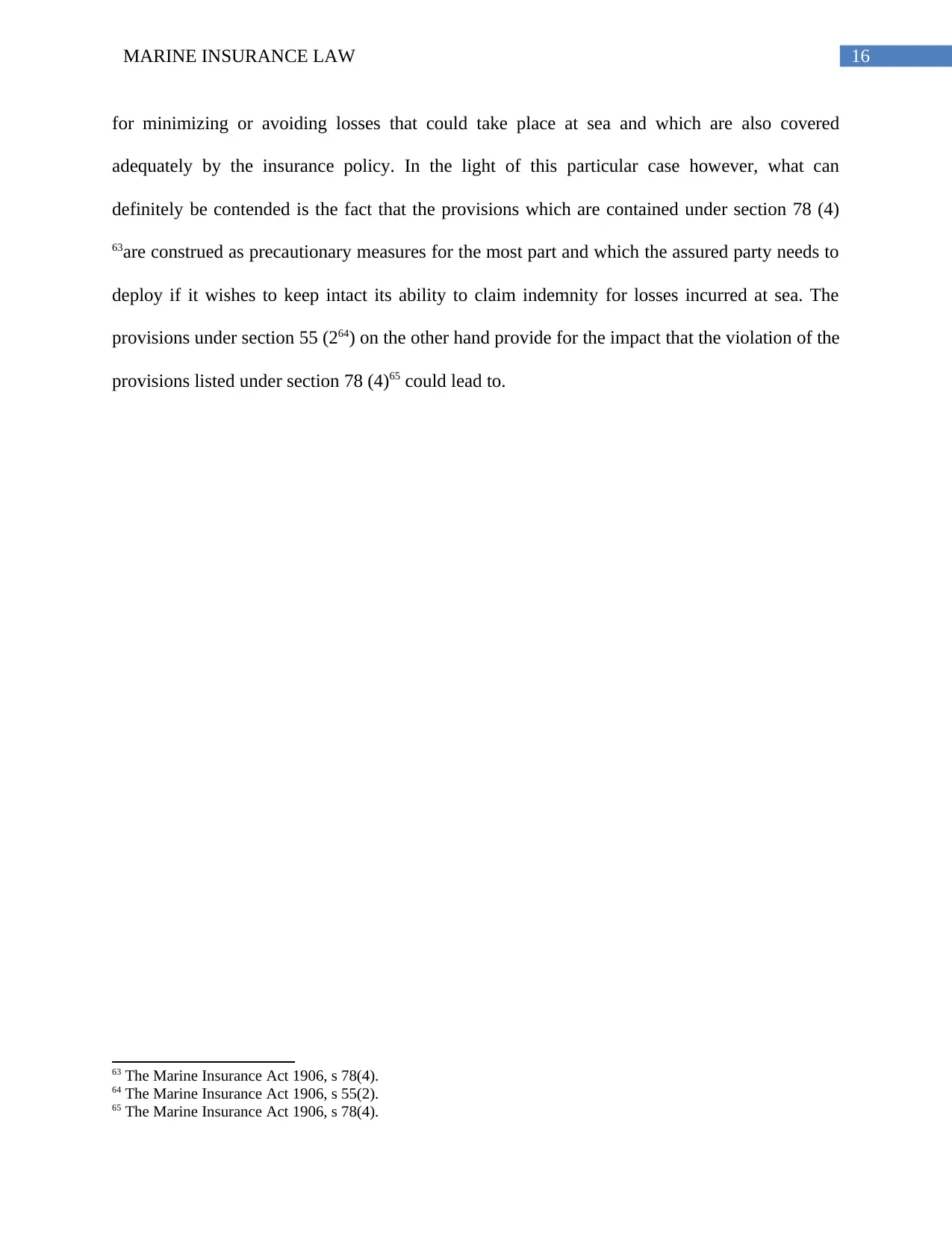
16MARINE INSURANCE LAW
for minimizing or avoiding losses that could take place at sea and which are also covered
adequately by the insurance policy. In the light of this particular case however, what can
definitely be contended is the fact that the provisions which are contained under section 78 (4)
63are construed as precautionary measures for the most part and which the assured party needs to
deploy if it wishes to keep intact its ability to claim indemnity for losses incurred at sea. The
provisions under section 55 (264) on the other hand provide for the impact that the violation of the
provisions listed under section 78 (4)65 could lead to.
63 The Marine Insurance Act 1906, s 78(4).
64 The Marine Insurance Act 1906, s 55(2).
65 The Marine Insurance Act 1906, s 78(4).
for minimizing or avoiding losses that could take place at sea and which are also covered
adequately by the insurance policy. In the light of this particular case however, what can
definitely be contended is the fact that the provisions which are contained under section 78 (4)
63are construed as precautionary measures for the most part and which the assured party needs to
deploy if it wishes to keep intact its ability to claim indemnity for losses incurred at sea. The
provisions under section 55 (264) on the other hand provide for the impact that the violation of the
provisions listed under section 78 (4)65 could lead to.
63 The Marine Insurance Act 1906, s 78(4).
64 The Marine Insurance Act 1906, s 55(2).
65 The Marine Insurance Act 1906, s 78(4).
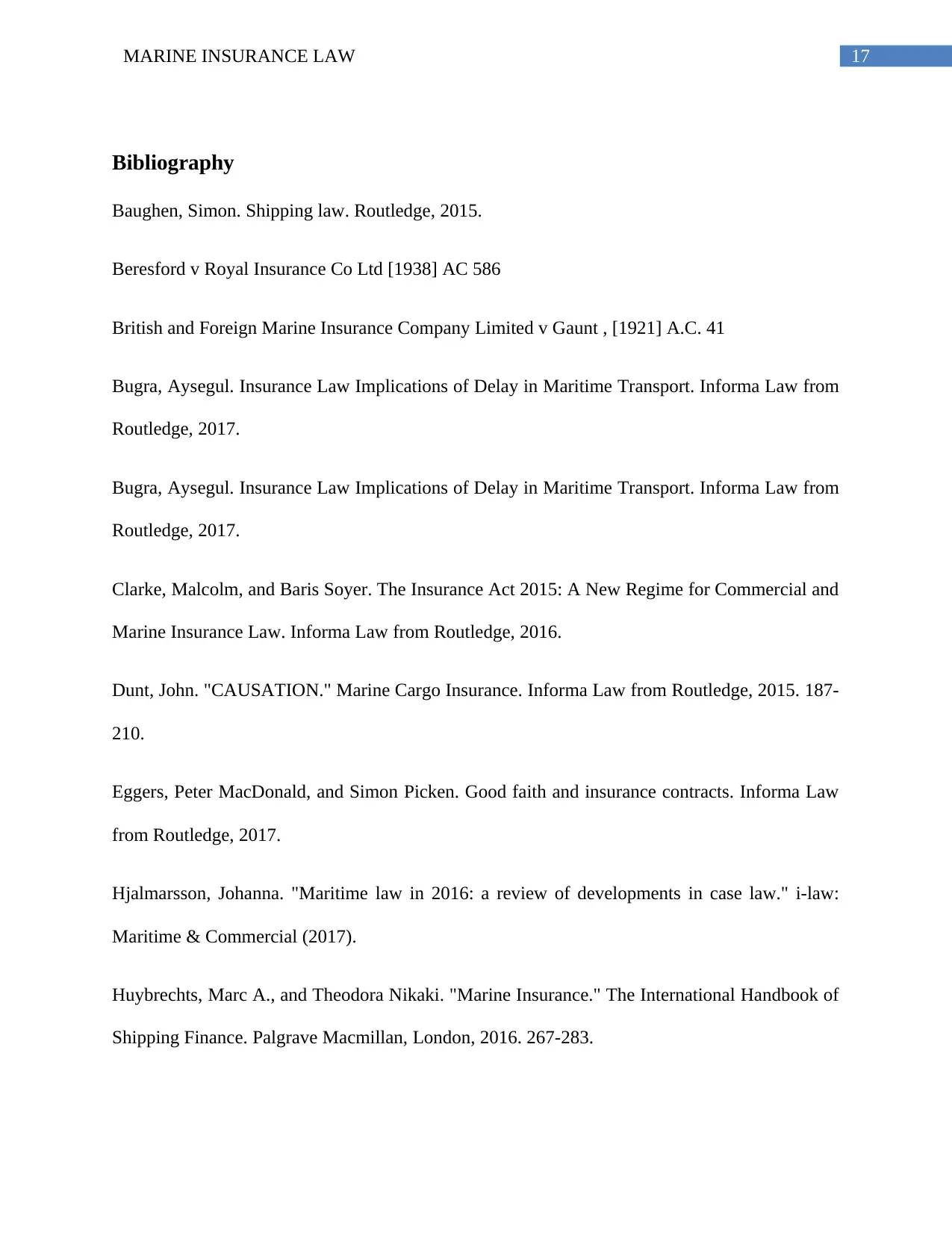
17MARINE INSURANCE LAW
Bibliography
Baughen, Simon. Shipping law. Routledge, 2015.
Beresford v Royal Insurance Co Ltd [1938] AC 586
British and Foreign Marine Insurance Company Limited v Gaunt , [1921] A.C. 41
Bugra, Aysegul. Insurance Law Implications of Delay in Maritime Transport. Informa Law from
Routledge, 2017.
Bugra, Aysegul. Insurance Law Implications of Delay in Maritime Transport. Informa Law from
Routledge, 2017.
Clarke, Malcolm, and Baris Soyer. The Insurance Act 2015: A New Regime for Commercial and
Marine Insurance Law. Informa Law from Routledge, 2016.
Dunt, John. "CAUSATION." Marine Cargo Insurance. Informa Law from Routledge, 2015. 187-
210.
Eggers, Peter MacDonald, and Simon Picken. Good faith and insurance contracts. Informa Law
from Routledge, 2017.
Hjalmarsson, Johanna. "Maritime law in 2016: a review of developments in case law." i-law:
Maritime & Commercial (2017).
Huybrechts, Marc A., and Theodora Nikaki. "Marine Insurance." The International Handbook of
Shipping Finance. Palgrave Macmillan, London, 2016. 267-283.
Bibliography
Baughen, Simon. Shipping law. Routledge, 2015.
Beresford v Royal Insurance Co Ltd [1938] AC 586
British and Foreign Marine Insurance Company Limited v Gaunt , [1921] A.C. 41
Bugra, Aysegul. Insurance Law Implications of Delay in Maritime Transport. Informa Law from
Routledge, 2017.
Bugra, Aysegul. Insurance Law Implications of Delay in Maritime Transport. Informa Law from
Routledge, 2017.
Clarke, Malcolm, and Baris Soyer. The Insurance Act 2015: A New Regime for Commercial and
Marine Insurance Law. Informa Law from Routledge, 2016.
Dunt, John. "CAUSATION." Marine Cargo Insurance. Informa Law from Routledge, 2015. 187-
210.
Eggers, Peter MacDonald, and Simon Picken. Good faith and insurance contracts. Informa Law
from Routledge, 2017.
Hjalmarsson, Johanna. "Maritime law in 2016: a review of developments in case law." i-law:
Maritime & Commercial (2017).
Huybrechts, Marc A., and Theodora Nikaki. "Marine Insurance." The International Handbook of
Shipping Finance. Palgrave Macmillan, London, 2016. 267-283.
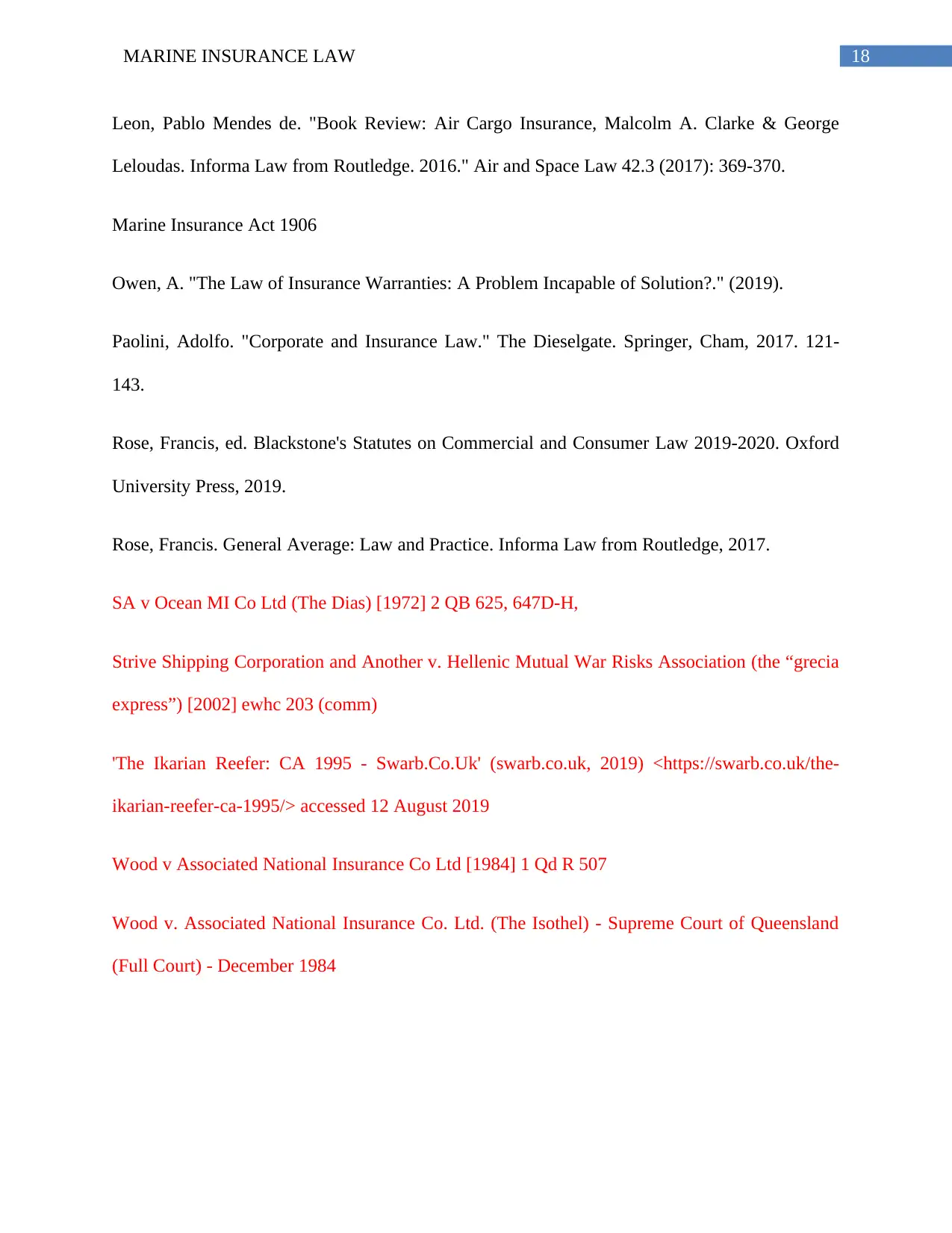
18MARINE INSURANCE LAW
Leon, Pablo Mendes de. "Book Review: Air Cargo Insurance, Malcolm A. Clarke & George
Leloudas. Informa Law from Routledge. 2016." Air and Space Law 42.3 (2017): 369-370.
Marine Insurance Act 1906
Owen, A. "The Law of Insurance Warranties: A Problem Incapable of Solution?." (2019).
Paolini, Adolfo. "Corporate and Insurance Law." The Dieselgate. Springer, Cham, 2017. 121-
143.
Rose, Francis, ed. Blackstone's Statutes on Commercial and Consumer Law 2019-2020. Oxford
University Press, 2019.
Rose, Francis. General Average: Law and Practice. Informa Law from Routledge, 2017.
SA v Ocean MI Co Ltd (The Dias) [1972] 2 QB 625, 647D-H,
Strive Shipping Corporation and Another v. Hellenic Mutual War Risks Association (the “grecia
express”) [2002] ewhc 203 (comm)
'The Ikarian Reefer: CA 1995 - Swarb.Co.Uk' (swarb.co.uk, 2019) <https://swarb.co.uk/the-
ikarian-reefer-ca-1995/> accessed 12 August 2019
Wood v Associated National Insurance Co Ltd [1984] 1 Qd R 507
Wood v. Associated National Insurance Co. Ltd. (The Isothel) - Supreme Court of Queensland
(Full Court) - December 1984
Leon, Pablo Mendes de. "Book Review: Air Cargo Insurance, Malcolm A. Clarke & George
Leloudas. Informa Law from Routledge. 2016." Air and Space Law 42.3 (2017): 369-370.
Marine Insurance Act 1906
Owen, A. "The Law of Insurance Warranties: A Problem Incapable of Solution?." (2019).
Paolini, Adolfo. "Corporate and Insurance Law." The Dieselgate. Springer, Cham, 2017. 121-
143.
Rose, Francis, ed. Blackstone's Statutes on Commercial and Consumer Law 2019-2020. Oxford
University Press, 2019.
Rose, Francis. General Average: Law and Practice. Informa Law from Routledge, 2017.
SA v Ocean MI Co Ltd (The Dias) [1972] 2 QB 625, 647D-H,
Strive Shipping Corporation and Another v. Hellenic Mutual War Risks Association (the “grecia
express”) [2002] ewhc 203 (comm)
'The Ikarian Reefer: CA 1995 - Swarb.Co.Uk' (swarb.co.uk, 2019) <https://swarb.co.uk/the-
ikarian-reefer-ca-1995/> accessed 12 August 2019
Wood v Associated National Insurance Co Ltd [1984] 1 Qd R 507
Wood v. Associated National Insurance Co. Ltd. (The Isothel) - Supreme Court of Queensland
(Full Court) - December 1984
1 out of 19
Related Documents
Your All-in-One AI-Powered Toolkit for Academic Success.
+13062052269
info@desklib.com
Available 24*7 on WhatsApp / Email
![[object Object]](/_next/static/media/star-bottom.7253800d.svg)
Unlock your academic potential
© 2024 | Zucol Services PVT LTD | All rights reserved.





